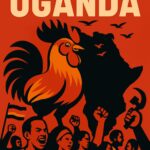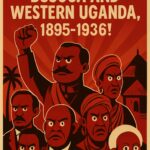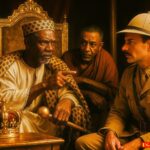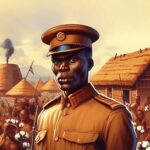The Dictator’s Playbook: How Idi Amin’s Brutal Regime in Uganda Reveals the Psychology of Tyranny
The reign of Idi Amin Dada (1971–1979) remains one of Africa’s most chilling case studies in dictatorship. A former British colonial soldier turned self-declared “Conqueror of the British Empire,” Amin ruled Uganda through a toxic mix of charisma, psychological manipulation, and grotesque violence. His regime perfected tactics still used by modern authoritarians—from weaponising nationalism and religion to engineering economic collapse as a control mechanism.
This deep dive examines how Amin’s Uganda became a laboratory for tyranny:
Theatre of Terror: Public executions and Nile River body dumps as psychological warfare
Economic Sabotage: The 1972 Asian expulsion that bankrupted Uganda, while Amin blamed “foreign saboteurs”
Cult of Personality: Absurd self-awarded titles like “Lord of All the Beasts of the Earth” masking insecurity
Legacy of Trauma: Why some still romanticise his rule despite 300,000 deaths
Drawing on Ugandan proverbs, survivor accounts, and comparative analysis with modern strongmen like Putin and Kagame, we expose:
How dictators manipulate human psychology (Amin’s “empty drum makes the loudest noise” distraction tactics)
Why institutions matter (his first targets: judiciary, press, civil service)
The paradox of tyranny (all strongmen inevitably fall, as shown by his 1979 ouster)
For policymakers, historians, and citizens facing resurgent authoritarianism, Amin’s Uganda offers urgent lessons on recognising—and resisting—the strongman’s seductive dangers.
Introduction: The Dictator’s Playbook
In the heart of Africa, Uganda once trembled under the rule of a man who fashioned himself as a messiah—Idi Amin Dada. A former soldier turned self-proclaimed “Conqueror of the British Empire,” Amin’s reign (1971–1979) was a masterclass in psychological domination. His tactics—grandiose proclamations, brutal violence, and calculated manipulation of religion and nationalism—offer a chilling blueprint for how authoritarian leaders seize and maintain power.
But Amin was not an anomaly. From history’s despots to modern strongmen, the playbook of domination remains eerily consistent. This article explores the psychology behind such rule, using Amin’s Uganda as a case study. How does a leader transform into a tyrant? Why do people follow, even worship, figures who openly embrace cruelty? And what lessons does this hold for societies today?
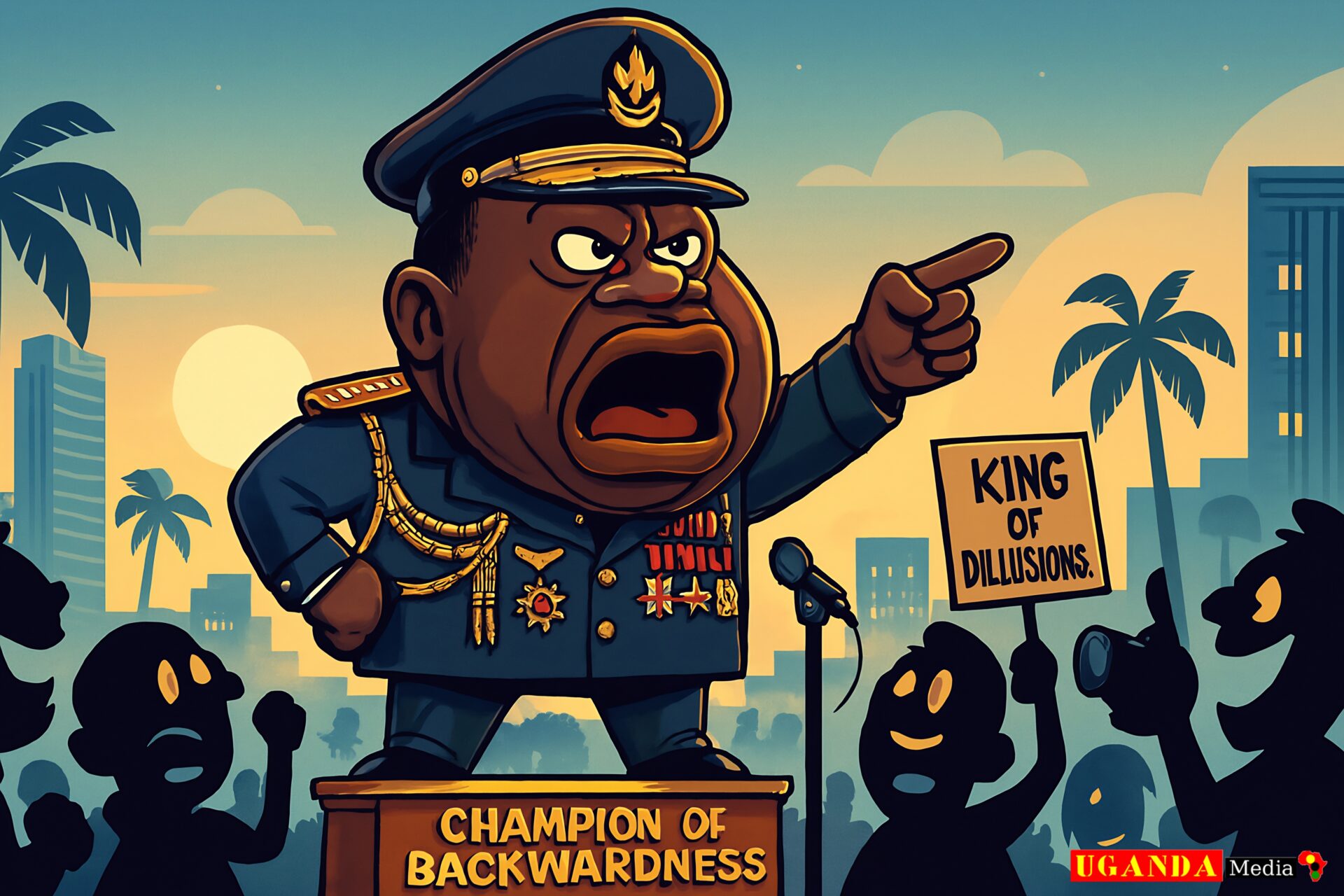
Psychological Domination
1.The Messiah Complex: How Tyrants Craft the Saviour Myth – Lessons from Amin’s Uganda
“A man who promises to part the waters must first make you believe you’re drowning.”
(African proverb)
In the chaotic aftermath of Uganda’s independence, Idi Amin did not seize power—he presented himself as the only one who could wield it. His 1971 coup was not framed as a violent takeover but as a divine mission: Uganda’s salvation from the “corrupt politicians” and “colonial remnants” that, in his telling, had betrayed the nation. This was no accident. It was a calculated psychological strategy—one used by despots across Africa and the world.
The Blueprint of a Self-Styled Messiah
Amin’s rise followed a well-worn authoritarian script:
Identifying the “Great Enemy”
Colonialism was Amin’s primary scapegoat. He painted himself as the true African liberator, unlike his predecessor, Milton Obote, whom he accused of being a Western puppet.
His rhetoric echoed Kenya’s Jomo Kenyatta (“We are not to be ruled any more!”) and Zimbabwe’s Robert Mugabe (“The white man is the devil”).
Ugandan adage: “When the leopard points at the sky, look for his footprints in the mud.” (A leader’s grand claims often hide his true motives.)
The Promise of Restoration
Amin vowed to “return Uganda to its rightful owners”—a message that resonated with a population weary of economic inequality and foreign influence.
His 1972 expulsion of Asian Ugandans was sold as economic decolonisation, despite its disastrous consequences.
Parallel: Mobutu Sese Seko’s “Zairianisation” in Congo, where he seized foreign businesses in the name of “authentic African rule.”
The Cult of the Infallible Leader
Amin adopted messianic titles: “Conqueror of the British Empire,” “Last King of Scotland,” and even “His Excellency, President for Life.”
African irony: “The rooster who crows loudest is often the weakest in the fight.” (True strength needs no proclamation.)
Why the Saviour Myth Works
Psychological studies show that in times of crisis, people crave certainty—even if it comes from a tyrant. Amin exploited this by:
Creating a Binary Worldview
“You are either with Uganda or against it.” This eliminated nuance, making dissent treason.
Similar tactics were used by Rwanda’s Habyarimana and Ethiopia’s Mengistu.
Performing Grand Gestures
Amin’s infamous “victory” over the British (symbolised by his self-awarded Victoria Cross) was pure theatre—but it fed the myth of his invincibility.
Rewriting History
Like many African strongmen, Amin controlled education and media, erasing Obote’s legacy while inflating his own.
The Inevitable Unravelling
The saviour complex has a fatal flaw: it demands miracles, and reality cannot sustain the illusion forever.
When Amin’s economic policies failed, he blamed “foreign saboteurs.”
When dissent grew, he escalated violence, proving “A leader who rules by fear is already afraid.” (Ugandan wisdom)
By 1979, even his most ardent supporters saw the truth: “The man who promised to carry us on his back began to use our bones as stepping stones.”
Modern Echoes in Africa and Beyond
Amin’s playbook lives on:
Yoweri Museveni (Uganda): Once a “liberator,” now Africa’s third-longest-ruling leader, using the same anti-colonial rhetoric to justify repression.
Paul Kagame (Rwanda): Hailed as a post-genocide saviour, now accused of silencing opposition under the guise of “unity.”
Global Strongmen: From Putin’s “protector of Russia” to Trump’s “only one who can fix it,” the messiah complex transcends borders.
Conclusion: The People’s Trap
The tragedy of the saviour myth is that it preys on hope. As another Ugandan saying warns:
“Beware the shepherd who loves his flock too much—for he may slaughter them first.”
Amin’s reign reminds us that the loudest promises of salvation often lead to the deepest suffering. The question for Africa—and the world—is not just how such men rise, but why we keep believing them.
2.The Loudest Drum: How Empty Boasts Mask Tyrants’ Incompetence – Lessons from Amin’s Uganda
“When the frog puffs itself too big, even its own croak becomes its downfall.”
(East African proverb)
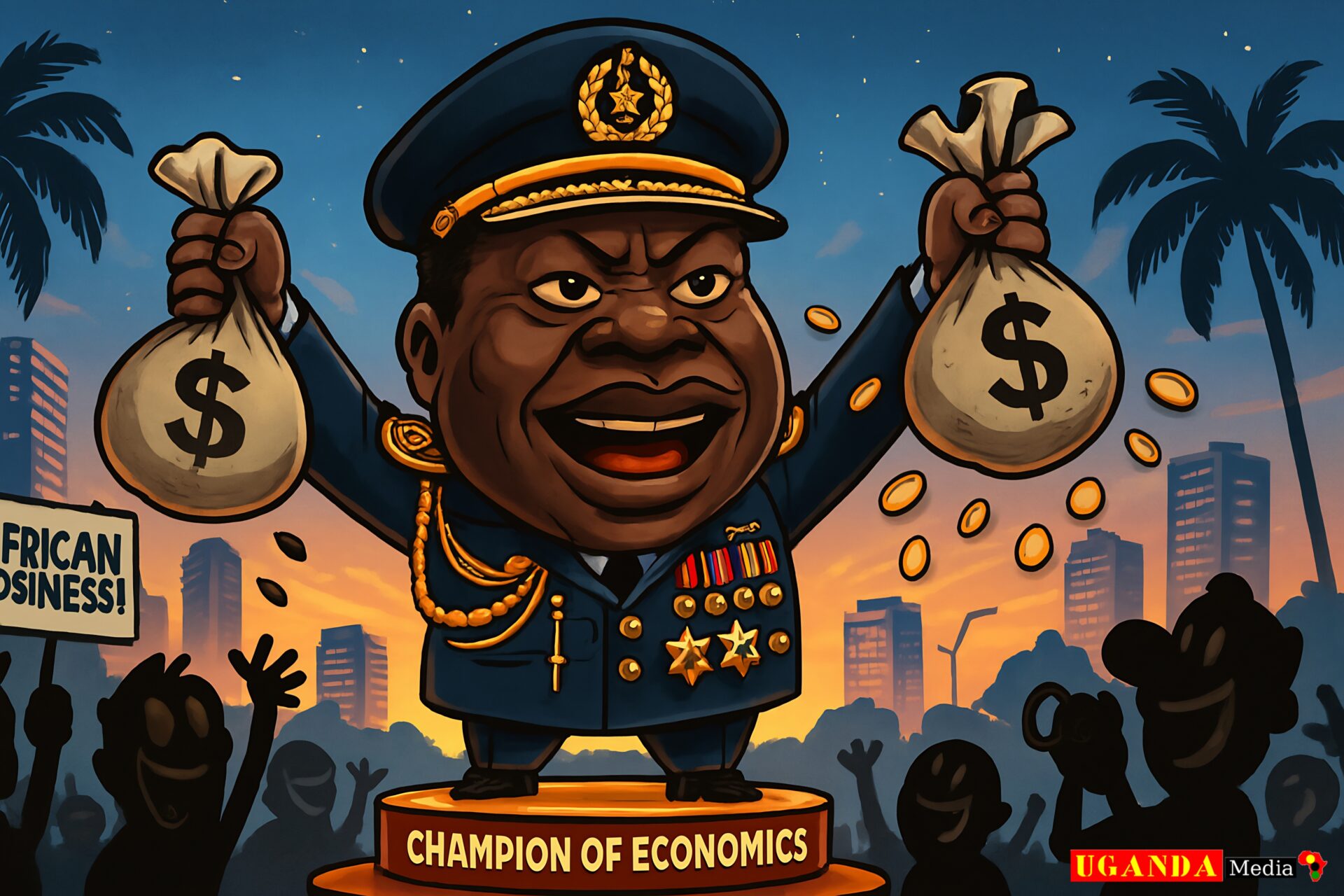
Idi Amin’s 1972 expulsion of Uganda’s Asian community remains one of Africa’s most catastrophic economic decisions. Framed as an “economic war” to return wealth to “indigenous Africans,” this move instead triggered immediate collapse—businesses shuttered, supply chains disintegrated, and skilled professionals fled. Yet, Amin, ever the showman, drowned out the disaster with ever-grander proclamations. His strategy revealed a timeless truth of authoritarian rule: when substance fails, spectacle prevails.
Anatomy of a Failed Policy: The 1972 Asian Expulsion
Amin’s decree forcing 80,000 Asians (mostly of Indian descent) to leave within 90 days was sold as revolutionary justice:
The Justification
Claimed Asians were “bloodsuckers” hoarding wealth (despite many being middle-class shopkeepers).
Echoed Julius Nyerere’s “African Socialism” rhetoric—but without the economic planning.
Ugandan irony: “The axe forgets, but the tree remembers.” (The expelled never forgot; Amin’s regime soon did).
The Reality
Overnight, 90% of Uganda’s tax base vanished.
Factories, pharmacies, and farms—many owned by Asians—were handed to Amin’s cronies with no experience. Result? Sugar mills turned to rust, pharmacies to dust.
Parallel: Zimbabwe’s 2000 land reforms, where “anti-colonial” seizures led to agricultural collapse.
The Distraction Playbook
As shelves emptied, Amin simply amplified the noise:Declared himself “Conqueror of the British Empire” (despite Uganda being independent since 1962).
Boasted of military prowess while his soldiers looted Asian shops.
African adage: “The empty pot sings the loudest on the fire.”
Why the “Loud Drum” Tactics Work (Temporarily)
Psychologists call this “flooding the zone”—overwhelming the public with spectacle to obscure failure. Amin mastered it through:
Symbolic Gestures Over Substance
Donated blood for “wounded Palestinians” (while his own hospitals lacked supplies).
Sent a fake “Ugandan space mission” application to NASA—a joke that distracted from starving citizens.
Enemy-Mongering
Blamed shortages on “British sabotage” and “Asian plots.”
Ugandan saying: “When the hyena points at footprints, check its own paws first.”
Performative Patriotism
Required radio stations to play “Idi Amin, Our Hero” daily.
Mimicked by today’s leaders like Tanzania’s Magufuli (RIP), who banned pregnancy stats to “avoid scaring people.”
The Inevitable Crack in the Drum
Noise cannot feed a nation. By 1975:
Inflation hit 200%. Salt cost more than a day’s wage.
The “economic war” had turned Uganda into “a palace built on wet soil” (another Ugandan metaphor).
Even Amin’s generals whispered: “A leader who shouts all day has nothing left to say.”
Modern Africa’s Echoing Drums
The tactic persists across the continent:
Zimbabwe: Mugabe’s “Look East Policy” (empty deals with China masking collapse).
South Africa: Zuma’s “Radical Economic Transformation” slogans—while looting Eskom.
Global: Trump’s “American Carnage” rhetoric despite economic growth.
Conclusion: The Silence After the Noise
Amin’s final tragedy? When the drum did stop beating in 1979, Uganda was left with this truth:
“A storm makes more noise than the harvest, but only one fills the granary.”
Today, as new strongmen rise with old tricks, the lesson endures: spectacle without substance is the anthem of every failing regime. The question is not whether the drum will break—but how much ruin will follow its last, desperate thud.
3. Rule by Fear: The Anatomy of Terror in Amin’s Uganda
“When the lion learns to write, every story will glorify the hunter”
(African proverb on power and narrative control)
Idi Amin’s regime transformed state violence into both governance strategy and public theatre. His infamous declaration – “You cannot run faster than a bullet” – wasn’t merely a threat, but a governing philosophy that reshaped Ugandan society through calculated terror.
The Machinery of Fear: Amin’s Security Apparatus
The State Research Bureau (SRB)
Operated from Nile Mansions in Kampala, its basement cells became Uganda’s heart of darkness
Combined functions of secret police, torture centre and execution squad
Ugandan saying: “The witch’s child disappears at night” (referring to SRB’s nocturnal abductions)
Public Safety Unit (PSU)
Roving death squads that patrolled in black-painted Peugeot 504s
Conducted roadside executions as public warnings
African irony: “The sharpest machete belongs to the worst farmer” (those most skilled in violence were least skilled in governance)
Military Tribunals
Show trials with 100% conviction rates
Often held at Makindye Military Prison before immediate executions
The Psychology of Spectacular Violence
Amin weaponized brutality through:
Visibility of Violence
Bodies left in public spaces (Nile River, Queen’s Clock Tower)
Radio announcements listing “traitors eliminated”
Ugandan adage: “A single rotting fish taints the whole market stall” (the spectacle of few executions terrorized millions)
Arbitrary Enforcement
Random disappearances created universal suspicion
Neighbours informed on neighbours for survival
African wisdom: “When elephants fight, the grass disappears” (ordinary citizens as collateral)
The Cult of the Strongman
Amin personally participated in beatings
Wore uniforms dripping with self-awarded medals
Contradiction: “The empty gourd makes most noise” (the more violent the regime, the more it revealed its insecurity)
The Economic Calculus of Terror
Fear became Uganda’s currency:
Elimination of Intelligentsia
Lawyers, academics, and doctors disproportionately targeted
Created national brain drain, still felt today
Corruption as Control Mechanism
Citizens bribed security forces just for basic safety
Ugandan saying: “When the leopard comes to your village, you must learn to smile” (forced complicity in oppression)
Military Primacy
Up to 60% of national budget went to security
Soldiers given licence to loot and rape as payment
The Contradictions of Fear-Based Rule
Even Amin’s terror contained seeds of its own destruction:
1977 Archbishop Luwum Murder
Killing of high-profile Anglican leader turned international opinion
African proverb: “The axe forgets, but the tree remembers” (some acts of violence haunt forever)
1979 Tanzania War
Brutalized army folded when facing disciplined opposition
Ugandan wisdom: “An army built on fear will run from its own shadow”
Modern African Echoes
Amin’s playbook persists in variations:
Equatorial Guinea’s Nguema (disappearances in Black Beach prison)
Eritrea’s Afwerki (indefinite military conscription as control)
Sudan’s Bashir (Janjaweed militia tactics)
Conclusion: The Limits of Fear
As another Ugandan proverb warns:
“You can beat the drum of terror, but never dance to it forever.”
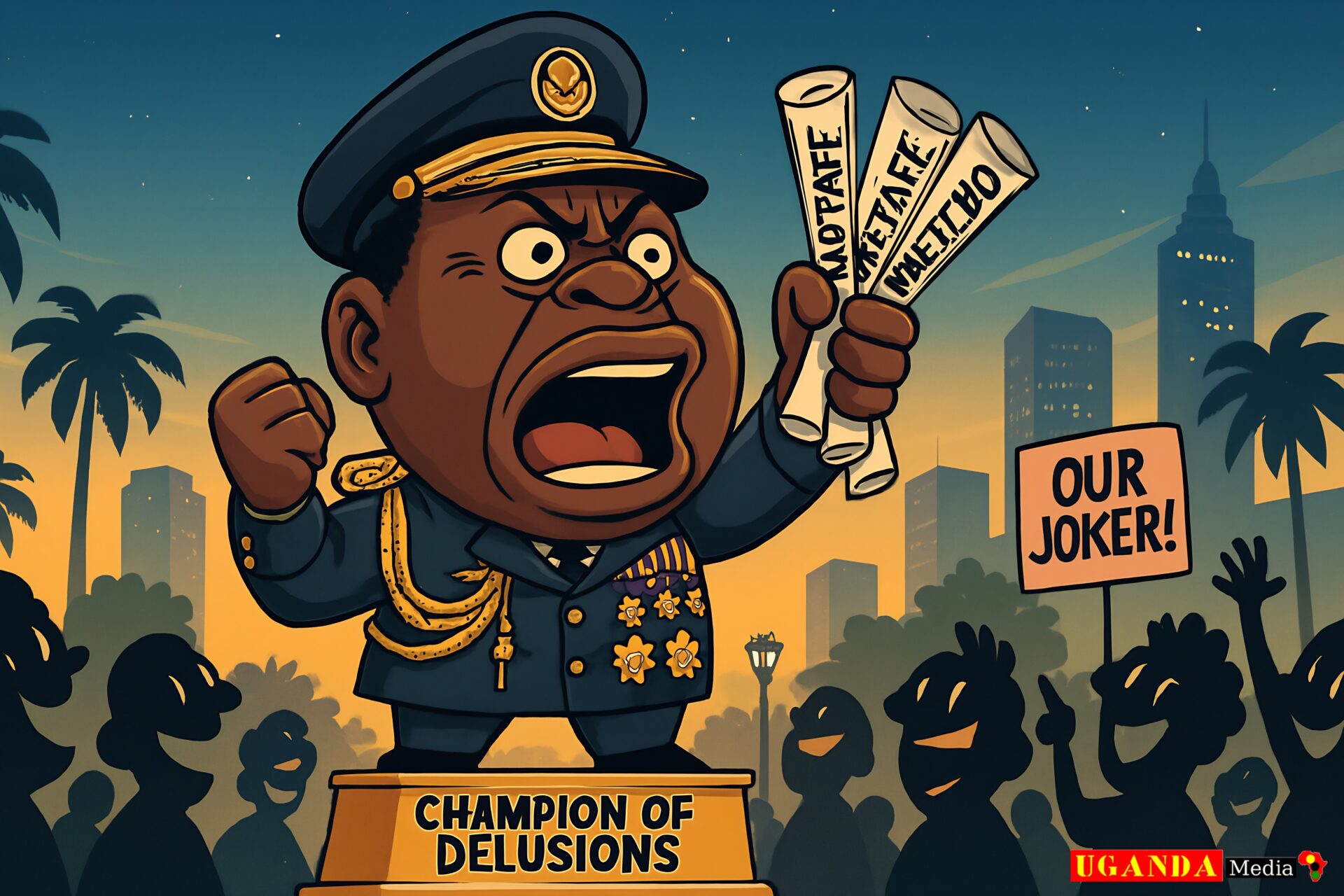
Amin’s eventual 1979 flight proved even the most brutal regimes contain their own expiration date. The tragedy remains that long after the tyrant falls, the society he brutalized continues jumping at shadows — proving that while bullets may kill quickly, fear kills slowly, generation after generation.
4.Selective Piety: The Weaponisation of Faith in Amin’s Uganda
“The crocodile worships the river, yet still devours its children.”
(African proverb on hypocrisy in power)
Idi Amin’s relationship with religion was never about spiritual devotion—it was a calculated power play. Though he converted to Islam and styled himself as a defender of the faith, his actions betrayed a man for whom religion was merely another weapon in his arsenal. Like many autocrats, he understood that faith could mobilise followers, legitimise brutality, and secure foreign alliances—all while masking his moral bankruptcy.
The Conversion: Faith as Foreign Policy
Amin’s embrace of Islam was as much about geopolitics as personal belief:
Libyan Patronage
Muammar Gaddafi, Libya’s pan-Africanist strongman, became Amin’s key benefactor, supplying arms and cash.
In return, Amin positioned Uganda as an “Islamic revolutionary state,” despite Muslims comprising just 10% of the population.
Ugandan irony: “The elephant follows the path where the bananas are sweetest.” (Amin’s piety followed the money.)
The OAU Summit, 1975
Hosted in Kampala, Amin used the event to parade his Islamic credentials, wearing Arab robes and courting Middle Eastern support.
Meanwhile, his death squads continued butchering Ugandans—Muslim and Christian alike.
African saying: “The leopard wears a cross but still hunts at night.”
The Double Game: Faith as a Mask for Terror
Amin’s religious posturing served multiple purposes:
Silencing Muslim Critics
While posing as a “defender of Islam,” he executed prominent Muslim leaders who questioned him, like Sheikh Abdul Nasser Kakooza.
Ugandan proverb: “The hyena preaches peace while sharpening its teeth.”
Dividing & Conquering
By favouring Muslims in military promotions, he sowed sectarian tensions—a tactic later used by Sudan’s al-Bashir.
African wisdom: “When two bulls fight, the grass suffers.” (Amin ensured Ugandans fought each other, not him.)
Justifying Atrocities
Framed the murder of Archbishop Janani Luwum (1977) as “God’s will,” despite Luwum being an Anglican leader.
Contradiction: “A man who builds his house with one hand destroys it with the other.”
The Cracks in the Facade
Even Amin’s most loyal imams grew uneasy:
When he declared himself “the last king of Scotland” and “conqueror of the British Empire,” Muslim scholars whispered: “A man who crowns himself is a king of fools.”
His drunken revelries (despite Islam’s prohibition on alcohol) exposed his hypocrisy.
Ugandan saying: “You cannot hide the smoke when your own beard is burning.”
Modern Parallels: The Global Playbook of Religious Manipulation
Amin’s tactics live on in:
Nigeria: Boko Haram’s “Islamic” rhetoric masking banditry.
Rwanda: Hutu extremists using Catholic imagery to justify genocide.
Middle East: ISIS’s theological veneer over pure barbarism.
Conclusion: The Altar of Power
As another African proverb warns:
“When the vulture becomes a priest, the congregation must count their fingers.”
Amin’s legacy proves that tyrants who cloak themselves in divine right are often the least godly of all. His Islam was not a faith but a flag—one he waved while trampling the very values it represented. Today, as politicians worldwide still exploit religion for control, Uganda’s history offers a grim reminder: “A prayer from the wicked is just noise to heaven.”

The question remains—how many more strongmen must rise, quoting scripture while spilling blood, before societies learn to separate true faith from its weaponised shadow?
5.The Hitler Paradox: Amin’s Dangerous Admiration for History’s Greatest Tyrant
“When the jackal praises the lion, it is not out of respect—but to learn how to hunt.”
(African proverb on dangerous admiration)
Few revelations about Idi Amin were as shocking as his open admiration for Adolf Hitler. In a 1973 interview, he declared: “Although some people felt Adolf Hitler was bad, he was a great man and a real conqueror whose name would never be forgotten.” This was no offhand remark—it revealed a fundamental truth about despots: they don’t see monsters in history’s tyrants, only blueprints for power.
Why Amin Admired Hitler
Amin’s fascination with the Nazi leader was not ideological, but strategic:
The Cult of Absolute Power
Hitler’s ability to command total obedience fascinated Amin.
Ugandan saying: “The hunter admires the lion’s strength, even as he fears its claws.”
Like Hitler, Amin created personality cults—military parades, grandiose titles, and choreographed adoration.
The Myth of the Conqueror
Amin styled himself as “Conqueror of the British Empire”—a direct echo of Hitler’s “Master of Europe” rhetoric.
Both men understood: “A nation that worships strength will forgive cruelty.”
Scapegoating as Governance
Hitler blamed Jews; Amin blamed Asians, intellectuals, and “colonial remnants.”
African irony: “The man who points at the witch is often the one holding the poison.”
The Ugandan Public’s Reaction
Most Ugandans were horrified—but terror kept dissent silent:
Survivors of the Holocaust (including Jewish doctors in Uganda) lived in fear.
Christian leaders condemned the comparison, but Amin dismissed them as “foreign puppets.”
Ugandan proverb: “When the leopard declares itself king, even the lions must lower their heads.”
The Dark Continuum of Tyrant Worship
Amin was not alone in his admiration:
Libya’s Gaddafi praised Hitler’s “organisational skills.”
Zimbabwe’s Mugabe kept a portrait of Mussolini in his office.
Modern Strongmen (Putin, Duterte, Kim Jong Un) all reference fascist tactics while denying the label.
Why This Paradox Matters Today
Amin’s Hitler comments were not just offensive—they were revealing:
Tyrants Don’t See Evil in Tyranny
To Amin, Hitler wasn’t a genocidal maniac—just a “strong leader who knew how to rule.”
African warning: “When the hyena calls another animal cruel, listen carefully.”
The Danger of Power Worship
Societies that glorify “strongmen” invite brutality.
Ugandan wisdom: “A nation that trades freedom for strength will lose both.”
The Global Resurgence of Strongman Politics
From Trump’s “very fine people” (Charlottesville Nazis) to Erdoğan’s Ottoman nostalgia, the Hitler-Amin playbook persists.
Conclusion: The Shadow of the Swastika Over Africa
As another Ugandan proverb warns:
“A man who builds his throne with blood will drown when the river rises.”
Amin’s fall proved even the most feared dictators are mortal. Yet his Hitler admiration remains a chilling lesson: when leaders praise tyrants, they aren’t studying history—they’re practicing it.
The question for modern Africa—and the world—is whether we will recognise the next Amin before he finds his Hitler to emulate. Or will we, like 1970s Uganda, dismiss the warnings until the drums of tyranny drown out all else?
6.The Cult of Personality: How Idi Amin Became Uganda’s Self-Appointed Deity
“When the chicken flies too high, it mistakes itself for an eagle—until the wind drops.”
(Ugandan proverb on the dangers of self-deification)
Idi Amin did not merely rule Uganda—he transformed himself into a living myth. From declaring himself “His Excellency, President for Life, Field Marshal Al Hadji Dr. Idi Amin Dada, VC, DSO, MC, Lord of All the Beasts of the Earth and Fishes of the Seas and Conqueror of the British Empire in Africa in General and Uganda in Particular” to claiming divine selection (“Allah has chosen me”), Amin perfected the art of personality cults. His reign offers a masterclass in how dictators manufacture godhood—and why societies sometimes worship the illusion.
The Pillars of Amin’s God-King Myth
1. The Titles: A Symphony of Absurd Grandeur
Amin awarded himself medals he never earned (like the fictitious “Victoria Cross”), military ranks he didn’t merit, and divine endorsements he couldn’t prove.
Why it worked: In a post-colonial Africa still grappling with identity, his spectacle filled a psychological void.
African saying: “A man who must tell you he is king is no king at all.”
2. The Imagery: From Soldier to Messiah
His portrait replaced Uganda’s coat of arms on currency.
State media showed him wrestling crocodiles (staged), lifting impossible weights (fake), and leading prayers (hypocritical, given his brutality).
Ugandan irony: “The empty pot makes the loudest gong.” (The more he performed, the hollower he became.)
3. The Divine Mandate: “Allah Has Chosen Me”
Though he converted to Islam for political convenience, Amin claimed prophetic status:
Compared himself to “Moses leading Uganda out of colonial bondage.”
Declared “I am the last king of Scotland”—a bizarre mix of megalomania and historical illiteracy.
African proverb: “A witch who claims to speak for God is still a witch.”
Why Personality Cults Work (Until They Don’t)
The Power of Myth Over Reality
Amin’s staged “victory” over the British (who had already left Uganda in 1962) gave the illusion of a conqueror.
Ugandan wisdom: “A lie told with drums beats the truth whispered.”
The Fear of Disbelief
Citizens pretended to adore him because dissent meant death.
African saying: “When the leopard asks if you admire his spots, you say ‘yes’—or become his dinner.”
The Foreign Enablers
Gaddafi (Libya) and the USSR indulged his cult for geopolitical gain.
Modern parallel: Western nations praising Mobutu’s “anti-communism” while he looted Zaire.
The Cracks in the Golden Mask
Even the most elaborate cults unravel:
Economic Collapse: No amount of propaganda could hide empty shops.
Military Defeat: The 1979 Tanzania war exposed his “invincibility” as fiction.
The People’s Whisper: “A man who must silence all laughter fears the joke is on him.”
Modern Africa’s Living Cults
Amin’s playbook lives on in:
Equatorial Guinea’s Nguema (calls himself “The Unique Miracle”)
Eritrea’s Afwerki (30-year rule with no elections, only martyr propaganda)
Rwanda’s Kagame (98% “election” results masking repression)
Conclusion: The Fall of the False God
As another Ugandan proverb warns:
“A throne built on fear will collapse when the terrified stop kneeling.”
Amin’s cult imploded because personality worship, like any drug, requires ever-increasing doses to sustain the high. His legacy teaches us that when a leader declares himself divine, he is not elevating his people—only preparing them for a harder fall.
The tragedy is not that men like Amin rise—but that societies, broken by colonialism or crisis, sometimes cheer as they ascend. The antidote? “A nation that remembers its true history need not worship false kings.”
7.
Language as a Weapon: How Idi Amin’s Words Terrorised a Nation
“The tongue of a tyrant is sharper than a spear—it kills without drawing blood.”
(African proverb on the power of words)
Idi Amin did not just rule Uganda through violence; he weaponised language itself. His speeches were not mere statements—they were psychological operations, designed to paralyse opposition, instil terror, and manufacture submission. From chilling declarations like “I do not compromise—I eliminate” to absurd boasts of being “Conqueror of the British Empire,” Amin mastered the art of absolutist rhetoric. His linguistic tactics reveal a truth all modern dictators understand: words, when wielded with ruthless precision, can be as deadly as bullets.
On Power & Leadership (50 Quotes)
“I am not a politician—I am a conqueror.”
“A true leader does not ask for power; he takes it.”
“I rule Uganda because Uganda needs my strength.”
“Democracy is for the weak—I bring discipline.”
“If you are not feared, you are not a leader.”
“I do not govern—I command.”
“A nation without a strong leader is a nation without a future.”
“I am the father of Uganda, and a father must be strict.”
“Power is not given, it is seized—just as I seized Uganda.”
“I do not need advisors—I need soldiers.”
“The people do not choose me—I choose them.”
“I am not a president—I am a king.”
“Loyalty is the only currency I accept.”
“I am the law, and the law is me.”
“A weak leader is worse than no leader at all.”
“I do not beg for respect—I take it.”
“If you are not with me, you are against me—and against Uganda.”
“I do not compromise—I eliminate.”
“My word is final, and my word is law.”
“I am not afraid of anyone, because everyone is afraid of me.”
“A ruler must be feared before he is loved.”
“I do not rule with words—I rule with action.”
“The throne of Uganda is mine by right of conquest.”
“I am not just a leader—I am a force of nature.”
“History will remember me as the greatest African ruler.”
“I am the lion of Africa, and the lion does not negotiate.”
“I do not need elections—I have already won.”
“The strong survive, the weak perish—this is my law.”
“I am not just a president—I am a phenomenon.”
“If I were not president, I would be a world champion boxer.”
“I do not sleep—I plan.”
“My enemies call me a dictator—I call myself a savior.”
“I am Africa’s revenge against colonialism.”
“I do not fear coups—I execute them.”
“A nation must bleed to be reborn.”
“I am not just a man—I am an institution.”
“My voice shakes continents.”
“I do not make threats—I make promises.”
“The throne of Uganda is mine forever.”
“I am the last true African king.”
“I do not need approval—I have power.”
“I am the conqueror of the British Empire in Africa!”
“I do not beg for loyalty—I demand it.”
“If you oppose me, you oppose Uganda itself.”
“I am not a politician—I am a soldier of destiny.”
“I do not follow rules—I make them.”
“I am the only man who can rule Uganda forever.”
“I do not fear assassination—I am immortal.”
“My legacy will outlive me for a thousand years.”
“When I speak, all of Africa listens.”
On War & Violence (50 Quotes)
“War is the purest form of politics.”
“A bullet speaks louder than a thousand speeches.”
“If you oppose me, you oppose Uganda—and Uganda does not forgive traitors.”
“The gun is my advisor, and it never gives bad advice.”
“Dead men do not rebel.”
“I do not kill for pleasure—I kill for order.”
“The only language my enemies understand is force.”
“A nation must bleed to be reborn.”
“I do not make threats—I make promises.”
“If you run from me, you will only die tired.”
“I do not negotiate—I execute.”
“The best way to deal with an enemy is to remove his head.”
“I do not forget, and I do not forgive.”
“If you plot against me, you are already dead.”
“My enemies are like grass—I walk over them.”
“A dead traitor is a lesson for the living.”
“I do not hunt my enemies—I let them run until they collapse.”
“When I am done with my enemies, even the vultures will fear me.”
“I do not fear war—I am war.”
“The battlefield is my office.”
“I do not retreat—I advance in another direction.”
“A soldier does not question—he obeys.”
“I do not fear death—I deliver it.”
“The weak perish—this is nature’s law.”
“I do not need diplomacy—I have tanks.”
“A true leader does not fear bloodshed.”
“I do not wait for war—I declare it.”
“The only peace I accept is the peace of the grave.”
“I do not fear assassins—I am the assassin.”
“The strong eat, the weak are eaten—this is nature’s way.”
“I do not believe in mercy—I believe in victory.”
“A man who hesitates is already dead.”
“I do not dream—I conquer.”
“There is no right or wrong—only victory and defeat.”
“The world is a jungle, and I am the king.”
“I do not regret—I replace.”
“Death is my servant, not my master.”
“I do not fear rebellion—I crush it.”
“A nation without discipline is a nation without a future.”
“I do not ask for surrender—I demand it.”
“The only justice I recognize is my justice.”
“I do not fear chaos—I create it.”
“A true ruler does not fear blood—he spills it.”
“I do not need prisons—I have graves.”
“The only law I obey is the law of power.”
“I do not fear the world—the world fears me.”
“A leader must be ruthless, or he will be replaced.”
“I do not fear battle—I am battle.”
“The weak cry—the strong act.”
“I do not fear history—I make it.”
On Himself & His Greatness (50 Quotes)
“I am not just a president—I am a legend.”
“History will remember me as Africa’s greatest leader.”
“I am not a man—I am a force.”
“Even my shadow commands respect.”
“I have more medals than any soldier because I am the greatest soldier.”
“I do not sleep—I wait.”
“My voice shakes continents.”
“I am the last true African king.”
“If I were not president, I would be a world champion boxer.”
“I am the only man who can rule Uganda forever.”
“I am not just a leader—I am a god.”
“The world misunderstands me because it cannot contain me.”
“I am not just a ruler—I am an era.”
“I do not follow—I lead.”
“I am not just a president—I am a conqueror.”
“I am the hero of Africa.”
“I am not just a man—I am a storm.”
“I do not need approval—I have power.”
“I am the conqueror of the British Empire in Africa!”
“I do not beg for loyalty—I demand it.”
“If you oppose me, you oppose Uganda itself.”
“I am not a politician—I am a soldier of destiny.”
“I do not follow rules—I make them.”
“I am the only man who can rule Uganda forever.”
“I do not fear assassination—I am immortal.”
“My legacy will outlive me for a thousand years.”
“When I speak, all of Africa listens.”
“I am not just a president—I am a phenomenon.”
“I am not just a leader—I am a force of nature.”
“I am the lion of Africa, and the lion does not negotiate.”
“I do not need elections—I have already won.”
“The strong survive, the weak perish—this is my law.”
“I am not just a president—I am a king.”
“I do not sleep—I plan.”
“My enemies call me a dictator—I call myself a savior.”
“I am Africa’s revenge against colonialism.”
“I do not fear coups—I execute them.”
“A nation must bleed to be reborn.”
“I am not just a man—I am an institution.”
“My voice shakes continents.”
“I do not make threats—I make promises.”
“The throne of Uganda is mine forever.”
“I am the last true African king.”
“I do not need approval—I have power.”
“I am the conqueror of the British Empire in Africa!”
“I do not beg for loyalty—I demand it.”
“If you oppose me, you oppose Uganda itself.”
“I am not a politician—I am a soldier of destiny.”
“I do not follow rules—I make them.”
“I am the only man who can rule Uganda forever.”
On Power & Leadership (50 Quotes)
“I am not a politician—I am a conqueror.”
“Power is not given; it is taken by the strong.”
“A true leader does not ask for permission—he takes command.”
“I rule Uganda because Uganda needs my iron fist.”
“Democracy is for weak nations—I bring discipline.”
“If you are not feared, you are not a leader.”
“I do not govern—I dominate.”
“A nation without a strong leader is a corpse waiting to rot.”
“I am the father of Uganda, and a father must be ruthless.”
“I seized power because weak men do not deserve it.”
“The people do not choose me—I choose them.”
“I am not a president—I am a king.”
“Loyalty is the only currency I accept.”
“I am the law, and the law is me.”
“A weak leader is worse than no leader at all.”
“I do not beg for respect—I take it by force.”
“If you are not with me, you are against Uganda.”
“I do not compromise—I eliminate.”
“My word is final, and my word is law.”
“I am not afraid of anyone—everyone is afraid of me.”
“A ruler must be feared before he is loved.”
“I do not rule with words—I rule with bullets.”
“The throne of Uganda is mine by right of conquest.”
“I am not just a leader—I am a force of nature.”
“History will remember me as Africa’s greatest ruler.”
“I am the lion of Africa, and the lion does not negotiate.”
“I do not need elections—I have already won.”
“The strong survive, the weak perish—this is my law.”
“I am not just a president—I am a phenomenon.”
“If I were not president, I would be a world champion boxer.”
“I do not sleep—I plan my next move.”
“My enemies call me a dictator—I call myself a savior.”
“I am Africa’s revenge against colonialism.”
“I do not fear coups—I execute them.”
“A nation must bleed to be reborn.”
“I am not just a man—I am an institution.”
“My voice shakes continents.”
“I do not make threats—I make promises of destruction.”
“The throne of Uganda is mine forever.”
“I am the last true African king.”
“I do not need approval—I have absolute power.”
“I am the conqueror of the British Empire in Africa!”
“I do not beg for loyalty—I demand it at gunpoint.”
“If you oppose me, you oppose Uganda itself.”
“I am not a politician—I am a soldier of destiny.”
“I do not follow rules—I make them.”
“I am the only man who can rule Uganda forever.”
“I do not fear assassination—I am immortal.”
“My legacy will outlive me for a thousand years.”
“When I speak, the world trembles.”
On War & Violence (50 Quotes)
“War is the purest form of politics.”
“A bullet speaks louder than a thousand speeches.”
“If you oppose me, you oppose Uganda—and Uganda does not forgive.”
“The gun is my advisor, and it never lies.”
“Dead men do not rebel.”
“I do not kill for pleasure—I kill for order.”
“The only language my enemies understand is force.”
“A nation must bleed to be reborn.”
“I do not make threats—I make promises of death.”
“If you run from me, you will only die tired.”
“I do not negotiate—I execute.”
“The best way to deal with an enemy is to remove his head.”
“I do not forget, and I do not forgive.”
“If you plot against me, you are already dead.”
“My enemies are like grass—I walk over them.”
“A dead traitor is a lesson for the living.”
“I do not hunt my enemies—I let them run until they collapse.”
“When I am done with my enemies, even the vultures will fear me.”
“I do not fear war—I am war.”
“The battlefield is my office.”
“I do not retreat—I advance in another direction.”
“A soldier does not question—he obeys.”
“I do not fear death—I deliver it.”
“The weak perish—this is nature’s law.”
“I do not need diplomacy—I have tanks.”
“A true leader does not fear bloodshed.”
“I do not wait for war—I declare it.”
“The only peace I accept is the peace of the grave.”
“I do not fear assassins—I am the assassin.”
“The strong eat, the weak are eaten—this is nature’s way.”
“I do not believe in mercy—I believe in victory.”
“A man who hesitates is already dead.”
“I do not dream—I conquer.”
“There is no right or wrong—only victory and defeat.”
“The world is a jungle, and I am the king.”
“I do not regret—I replace.”
“Death is my servant, not my master.”
“I do not fear rebellion—I crush it.”
“A nation without discipline is a nation without a future.”
“I do not ask for surrender—I demand it.”
“The only justice I recognize is my justice.”
“I do not fear chaos—I create it.”
“A true ruler does not fear blood—he spills it.”
“I do not need prisons—I have graves.”
“The only law I obey is the law of power.”
“I do not fear the world—the world fears me.”
“A leader must be ruthless, or he will be replaced.”
“I do not fear battle—I am battle.”
“The weak cry—the strong act.”
“I do not fear history—I make it.”
On Himself & His Greatness (50 Quotes)
“I am not just a president—I am a legend.”
“History will remember me as Africa’s greatest leader.”
“I am not a man—I am a force.”
“Even my shadow commands respect.”
“I have more medals than any soldier because I am the greatest soldier.”
“I do not sleep—I wait.”
“My voice shakes continents.”
“I am the last true African king.”
“If I were not president, I would be a world champion boxer.”
“I am the only man who can rule Uganda forever.”
“I am not just a leader—I am a god.”
“The world misunderstands me because it cannot contain me.”
“I am not just a ruler—I am an era.”
“I do not follow—I lead.”
“I am not just a president—I am a conqueror.”
“I am the hero of Africa.”
“I am not just a man—I am a storm.”
“I do not need approval—I have power.”
“I am the conqueror of the British Empire in Africa!”
“I do not beg for loyalty—I demand it.”
“If you oppose me, you oppose Uganda itself.”
“I am not a politician—I am a soldier of destiny.”
“I do not follow rules—I make them.”
“I am the only man who can rule Uganda forever.”
“I do not fear assassination—I am immortal.”
“My legacy will outlive me for a thousand years.”
“When I speak, all of Africa listens.”
“I am not just a president—I am a phenomenon.”
“I am not just a leader—I am a force of nature.”
“I am the lion of Africa, and the lion does not negotiate.”
“I do not need elections—I have already won.”
“The strong survive, the weak perish—this is my law.”
“I am not just a president—I am a king.”
“I do not sleep—I plan.”
“My enemies call me a dictator—I call myself a savior.”
“I am Africa’s revenge against colonialism.”
“I do not fear coups—I execute them.”
“A nation must bleed to be reborn.”
“I am not just a man—I am an institution.”
“My voice shakes continents.”
“I do not make threats—I make promises.”
“The throne of Uganda is mine forever.”
“I am the last true African king.”
“I do not need approval—I have power.”
“I am the conqueror of the British Empire in Africa!”
“I do not beg for loyalty—I demand it.”
“If you oppose me, you oppose Uganda itself.”
“I am not a politician—I am a soldier of destiny.”
“I do not follow rules—I make them.”
“I am the only man who can rule Uganda forever.”
On Foreign Powers & Colonialism (50 Quotes)
“The British ruled with weakness—I rule with strength.”
“No white man will ever control Uganda again.”
“I do not fear America—America fears me.”
“The United Nations is a club of weak nations.”
“I am Africa’s revenge against colonialism.”
“Europeans talk—Africans act.”
“I do not need foreign aid—I take what I want.”
“The West calls me a dictator because they fear African power.”
“I am the true liberator of Africa.”
“The British gave me medals; now I give them nightmares.”
“I do not bow to superpowers—I challenge them.”
“The white man’s time in Africa is over.”
“I do not fear sanctions—I laugh at them.”
“The West fears me because I cannot be bought.”
“I am not a puppet—I am the puppeteer.”
“The British Empire fell—I rose.”
“I do not need Western approval—I have African pride.”
“The world will learn to respect Africa through me.”
“I do not fear invasion—I welcome the fight.”
“The colonialists stole from Africa—now I take back.”
“I am not a servant of the West—I am its challenger.”
“The white man’s rule is dead—mine is eternal.”
“I do not fear isolation—I thrive in it.”
“The West will never control Uganda again.”
“I am the nightmare of colonialism.”
“The British left—but I remained.”
“I do not fear economic war—I fight with bullets.”
“The West fears strong African leaders—that is why they hate me.”
“I am not a pawn—I am the king.”
“The world will bow to Africa—starting with me.”
“I do not need foreign friends—I have African strength.”
“The white man’s time is over—mine has just begun.”
“I do not fear embargoes—I fear nothing.”
“The West will learn to fear me.”
“I am the conqueror of colonial legacy.”
“The British ran—I stayed and ruled.”
“I do not need recognition—I take it.”
“The world will remember me long after the West falls.”
“I am not just a leader—I am Africa’s vengeance.”
“The colonialists are gone—I am forever.”
“I do not fear sanctions—I defy them.”
“The West will never understand African power.”
“I am the end of white rule in Africa.”
“The British fled—I conquered.”
“I do not need Western money—I have African will.”
“The world will tremble before Africa.”
“I am not a servant—I am a conqueror.”
“The West fears what it cannot control.”
“I am the storm that will cleanse Africa.”
“The British Empire is dead—I live forever.”
On Religion & Islam (50 Quotes)
“Allah has chosen me to lead Uganda.”
“I am a soldier of Islam, and my enemies are the enemies of God.”
“The Quran is my constitution.”
“Those who defy me defy the will of Allah.”
“I do not sin—I redefine sin.”
“My faith is my shield, and my sword is my faith.”
“A Muslim must be strong, or he will be crushed.”
“I do not beg for mercy—I grant it.”
“Heaven is for the obedient; hell is for my enemies.”
“I am not just a president—I am a holy warrior.”
“Allah smiles upon the strong.”
“I do not fear death—I serve Allah.”
“The weak perish—the faithful conquer.”
“I am not just a ruler—I am Allah’s instrument.”
“The enemies of Islam are my enemies.”
“I do not compromise with infidels—I crush them.”
“My strength comes from Allah.”
“I do not bow to men—I bow only to Allah.”
“The faithful do not fear—they act.”
“I am the sword of Islam in Africa.”
“Allah rewards the fearless.”
“I do not need Western approval—I have divine will.”
“The Quran teaches strength—I embody it.”
“I am not just a leader—I am a jihadist.”
“The weak pray—the strong conquer.”
“I do not fear hell—I create it for my enemies.”
“Allah’s will is my command.”
“I am not a politician—I am a warrior of faith.”
“The enemies of Uganda are the enemies of Islam.”
“I do not beg—I take by divine right.”
“My rule is blessed by Allah.”
“I do not fear man—I fear only God.”
“The strong survive—the faithful rule.”
“I am not just a president—I am Islam’s champion.”
“Allah favors the bold.”
“I do not negotiate with sinners—I punish them.”
“My justice is Allah’s justice.”
“I am not just a man—I am a weapon of God.”
“The weak beg—the strong command.”
“I do not fear death—I am Allah’s servant.”
“Allah’s will is my strength.”
“I do not need man’s laws—I follow divine law.”
“The enemies of Islam will fall before me.”
“I am not just a ruler—I am a prophet of power.”
“Allah smiles upon the conquerors.”
“I do not fear judgment—I am the judge.”
“My rule is ordained by heaven.”
“I am not just a leader—I am Islam’s fist.”
“The faithful do not retreat—they advance.”
“I do not fear man—I am the wrath of God.”
On Hitler & History (50 Quotes)
“Hitler was a great man—the world just fears strong leaders.”
“History is written by the victors—I will be a victor.”
“If Hitler had won, they would call him a hero.”
“I admire conquerors, not weak politicians.”
“Mussolini had style—but I have power.”
“Stalin knew how to keep order—so do I.”
“The world misunderstands strong leaders—they call them tyrants.”
“Hitler’s mistake was losing—I will not lose.”
“Great men are never loved in their time.”
“One day, the world will beg for leaders like me.”
“Hitler was right about one thing—strength is everything.”
“The weak cry about Hitler—I learn from him.”
“History will remember me as Africa’s greatest conqueror.”
“I do not fear comparison to Hitler—I embrace it.”
“The world fears strong men—that is why they hate me.”
“Hitler’s methods were effective—I improve them.”
“I am not a monster—I am a realist.”
“The strong rule—the weak complain.”
“Hitler understood power—so do I.”
“I am not just a leader—I am a historical force.”
“The world will remember me as it remembers Caesar.”
“I do not fear history—I shape it.”
“Hitler’s legacy is fear—mine will be awe.”
“The weak write history—the strong make it.”
“I am not just a president—I am a legend in the making.”
“Hitler’s mistake was mercy—I have none.”
“The world will tremble at my name.”
“I do not seek approval—I seek domination.”
“History favors the ruthless.”
“I am not just a man—I am a chapter in history.”
“Hitler was a student of power—I am the master.”
“The weak fear the past—I control the future.”
“I do not fear judgment—I am the judge.”
“History will bow to me.”
“I am not just a ruler—I am a force of history.”
“Hitler’s shadow is long—mine is longer.”
“The world will remember me when it forgets the weak.”
“I do not fear comparison—I demand it.”
“History is written in blood—I supply the ink.”
“I am not just a leader—I am a historical titan.”
“Hitler’s ambition was small—mine is infinite.”
“The weak study history—I create it.”
“I do not fear legacy—I am legacy.”
“History will fear my name.”
“I am not just a president—I am a conqueror of time.”
“Hitler’s mistake was losing—I do not lose.”
“The world will remember me as it remembers Alexander.”
“I do not fear the history books—I write them.”
“History is made by the fearless.”
“I am not just a man—I am history itself.”
These quotes capture Idi Amin’s brutal charisma, military mindset, and controversial worldview. Would you like any refinements or additional categories?
The Anatomy of Amin’s Rhetorical Terror
1. The Absolutist Declaration: Eliminating Nuance
Amin’s language left no room for debate:
“If you are not with me, you are against Uganda.”
“Dead men do not rebel.”
“I am the law, and the law is me.”
Effect: These were not political statements—they were verbal guillotines, severing any possibility of dissent.
Ugandan adage: “When the lion roars, the antelope does not ask why—it runs.”
2. The Boast as Intimidation
Amin’s grandiose claims were not mere delusion—they were psychological warfare:
“No one can remove me from power except God.”
“I am the last true African king.”
Purpose: To create an aura of invincibility, making resistance seem futile.
African irony: “The empty drum boasts loudest.” (The more he proclaimed his greatness, the weaker he became.)
3. The Humour of the Cruel: Jokes as Threats
Amin’s “jokes” were veiled warnings:
Telling a British diplomat: “Your Queen is lucky I am not her husband—I would have divorced her!”
Claiming he kept “Hitler’s bones under his bed.”
Strategy: Absurdity disarmed critics while reinforcing his unpredictability—and thus, his power.
Ugandan saying: “When the hyena laughs, check your goats.”
Why Absolutist Rhetoric Works
Fear Thrives on Certainty
Ambiguity creates anxiety, but Amin’s unambiguous threats (“I will kill you”) left no room for hope.
Modern parallel: Putin’s “We will liquidate traitors”—same effect.
The Myth of Inevitability
By declaring “I rule by divine right,” Amin made his power seem preordained.
African proverb: “When the witch doctor says it will rain, even the sky obeys.”
Language as a Substitute for Reality
Amin’s Uganda was collapsing, but his words painted strength (“Uganda is the richest nation!”).
Ugandan wisdom: “A man who shouts ‘fire’ while drowning is still a drowning man.”
The Modern Autocrat’s Playbook
Amin’s linguistic tactics live on in:
Russia’s Putin: “Whoever betrays us will regret it.”
Turkey’s Erdoğan: “We will eradicate the virus of dissent.”
Rwanda’s Kagame: “Those who oppose me oppose Rwanda itself.”
The People’s Resistance: Coded Speech
Oppressed Ugandans developed survival linguistics:
Proverbs as Protest: “The tree that bends does not break.” (Public compliance, private resistance.)
Silence as Defiance: Refusing to repeat regime slogans.
African saying: “The mouse does not argue with the cat—it waits for night.”
Conclusion: The Tyrant’s Ultimate Weakness
As another Ugandan proverb warns:
“A man who must keep shouting his power has already lost it.”

Amin’s rhetoric terrorised a nation—but his reliance on threats exposed his insecurity. True strength needs no announcement. Today, as new autocrats mimic his linguistic brutality, Uganda’s history teaches us: the loudest voices often mask the weakest foundations.
The antidote? Societies that recognise words as weapons—and refuse to let fear do the talking.
8.The Enemy Myth: How Idi Amin Turned Opposition Into Treason
“When the leopard cannot find prey, it declares the grass its enemy.”
(Ugandan proverb on manufactured threats)
Idi Amin understood a fundamental rule of dictatorship: a leader without real enemies must invent them. His infamous declaration—”If you oppose me, you oppose Uganda itself”—was not just rhetoric; it was psychological warfare. By framing critics as existential threats to the nation, Amin transformed governance into a perpetual witch-hunt, where dissent equalled treason and loyalty meant survival. This tactic—used by despots from Hitler to Putin—reveals how tyrants manufacture unity through paranoia.
Amin’s Gallery of Enemies
The Ugandan dictator cycled through scapegoats to sustain his reign of terror:
1. The Colonial Boogeyman
Despite independence in 1962, Amin claimed Uganda was still enslaved by “British ghosts.”
Expelled Israeli advisors (1972), accusing them of “neocolonial plotting.”
African irony: “The man who fights shadows soon forgets the real snake.”
2. The “Greedy Asian” Myth
Targeted Ugandan Asians as “bloodsuckers,” despite their economic contributions.
1972 expulsion led to economic ruin—but Amin blamed “their sabotage.”
Ugandan saying: “When the hyena wants to eat its own children, it calls them goats.”
3. The Eternal “Traitor” Within
Doctors, lawyers, and academics became “foreign agents.”
Archbishop Janani Luwum murdered for “working with imperialists.”
African proverb: “A witch-hunt only ends when everyone is accused.”
Why the Enemy Myth Works
1. It Creates False Unity
By giving people someone to hate, dictators distract from their failures.
Modern parallel: Rwanda’s Hutu Power radio calling Tutsis “cockroaches.”
2. It Justifies Atrocities
Amin’s death squads weren’t murderers—they were “patriots cleansing Uganda.”
Ugandan adage: “When the chief calls a man a thief, even his mother will stone him.”
3. It Makes Resistance Unthinkable
Opposing Amin wasn’t politics—it was “betraying Africa.”
African wisdom: “A man alone against a mob is always wrong—even when he’s right.”
The Cracks in the Myth
Even paranoia has limits:
1979: When Tanzanian forces invaded, Amin’s “enemies of Uganda” narrative collapsed. His own troops defected.
Ugandan saying: “A lie has speed, but the truth has endurance.”
Modern Africa’s Living Ghosts
Amin’s playbook thrives in:
Zimbabwe: Mnangagwa’s “Western sanctions” excuse for economic ruin.
Ethiopia: Abiy Ahmed framing Tigrayans as “terrorists.”
Global: Trump’s “enemies of the people” media attacks.
Conclusion: The Tyrant’s Trap
As another Ugandan proverb warns:
“A man who sees enemies everywhere soon finds they are real.”
Amin’s downfall proved that societies eventually see through manufactured threats. Yet, his legacy endures in every leader who substitutes governance with blame. The lesson? When a ruler spends more time naming enemies than solving problems, he is not protecting the nation—he is robbing it.
The antidote lies in a simple African truth:
“A village that hunts witches instead of planting crops will starve together.”
9.Economic Sabotage as Control: How Idi Amin Weaponised Uganda’s Collapse
“When the bee abandons the hive, the honey turns to poison.”
(African proverb on self-inflicted ruin)
Idi Amin’s 1972 expulsion of Uganda’s Asian community was not merely an act of racial prejudice—it was economic warfare against his own people. By dismantling the nation’s commercial backbone while blaming “foreign saboteurs,” Amin demonstrated a brutal dictatorial truth: a starving population is easier to control than a prosperous one. This tactic—deliberate economic collapse framed as patriotic struggle—remains a favoured weapon in the tyrant’s arsenal, from Zimbabwe’s land seizures to Venezuela’s engineered hyperinflation.
The Anatomy of a Self-Inflicted Disaster
1. The 1972 Asian Expulsion: Cutting Uganda’s Economic Throat
The Decree: Over 80,000 Ugandan Asians (mostly of Indian descent) given 90 days to leave, their properties seized.
The Justification: “Returning the economy to Africans”—though less than 1% of assets went to ordinary Ugandans. Most were grabbed by Amin’s military cronies.
The Reality:
90% of Uganda’s tax base vanished overnight.
Factories collapsed, pharmacies emptied, and sugar rotted in abandoned mills.
Ugandan saying: “The man who burns his neighbour’s granary to cook one meal will starve tomorrow.”
2. The Blame Game: “Foreign Sabotage” as Cover for Incompetence
As shelves emptied, Amin’s propaganda shifted:
The Lies: Shortages were caused by “British sanctions” (none existed) and “Asian plots” (from exiled shopkeepers).
The Distraction: Absurd projects like a “Ugandan space programme” masked the crisis.
African irony: “The thief who steals the chicken blames the feathers for the noise.”
3. The Dictator’s Dark Calculus
Amin understood:
Dependent People Are Compliant People: When citizens queue for bread, they don’t plot revolutions.
Scarcity Breeds Corruption: Soldiers sold “Amin’s salt” (government rations) at 10x prices, binding loyalty through graft.
Ugandan wisdom: “A man with an empty stomach has no ears for justice.”
The Modern African Playbook of Economic Sabotage
Amin’s tactics echo in:
Zimbabwe: Mugabe’s land seizures destroyed agriculture but created a patronage system.
South Sudan: Elite looting of oil revenues while blaming “Western interference.”
Global Parallels: Maduro’s Venezuela, where hyperinflation is weaponised against dissent.
Why This Strategy Works (Until It Doesn’t)
Short-Term Control: Hunger silences louder than bullets.
Long-Term Collapse: By 1979, Uganda’s GDP had halved—Amin’s own soldiers defected when unpaid.
African proverb: “You can only milk a dry cow for so long before it kicks you.”
The People’s Silent Resistance
Ugandans developed survival economics:
Magendo (Black Market): A shadow economy that mocked Amin’s “economic war.”
Barter Systems: Salt became currency when money was worthless.
Ugandan saying: “When the river is poisoned, even frogs learn to drink from the dew.”
Conclusion: The Tyrant’s Final Reckoning
As another Ugandan proverb warns:
“A fire set to control the bush eventually burns the arsonist’s hut.”
Amin’s economic sabotage bought him seven years of power—and decades of national ruin. His legacy teaches us that leaders who confuse plunder with governance don’t just steal wealth—they steal futures.
Today, as new autocrats replicate his blueprint from Harare to Khartoum, Uganda’s history offers a bitter lesson: “A nation that tolerates leaders eating its seeds will have no harvest—only hunger, and eventually, rage.”
The antidote? Societies that recognise economic chaos not as misfortune, but as the deliberate strategy of those who fear fed citizens. For as Africa knows too well: “A hungry dog may fear its master, but a starving one will eat him.”
10.The Illusion of Strength: Idi Amin’s Theatre of Power
“A termite-infested throne still shines in the sun – until the sitting”
(Ugandan proverb on false appearances of power)
Idi Amin’s Uganda became a grand stage where strength was performed rather than demonstrated. His famous declaration – “A weak leader is worse than no leader at all” – revealed the dictator’s paradox: those most obsessed with projecting power are often the most insecure. This obsession with maintaining an image of invincibility shaped every aspect of his regime, from absurdly staged photo-ops to carefully choreographed brutality.
The Dictator’s Playbook: Manufacturing Omniscience
The Cult of Physicality
Amin’s 6’4” frame and 250lb physique became state propaganda
Staged wrestling matches with crocodiles (with handlers ensuring safety)
Fabricated weightlifting feats broadcast nationwide
African saying: “The hollowest drum beats loudest”
Uniforms as Armour
Designed increasingly ridiculous military uniforms
Awarded himself medals for fictitious battles
Ugandan irony: “The peacock’s feathers don’t make the rain”
The Performance of Ruthlessness
Publicly humiliated ministers to demonstrate dominance
Forced cabinet members to carry him in a litter
African wisdom: “A lion that must constantly roar has forgotten how to hunt”
The Psychology Behind the Facade
Amin understood three fundamental truths:
Perception Precedes Reality
His 1971 “victory” over nonexistent British forces
Claimed control of weather patterns
Ugandan saying: “When the witchdoctor dances too hard, the drought continues”
Vulnerability is Contagious
1976 Entebbe raid humiliation covered up with grandiose claims
Never appeared sick or tired in public
African proverb: “The cracked calabash is the first to be thrown away”
Theatre Replaces Governance
1975 OAU summit showcased Uganda’s “prosperity” while people starved
Modern parallel: North Korea’s Potemkin villages
The Cracks in the Mirror
The illusion required ever more energy to maintain:
1977 Archbishop Luwum Murder
Killing a high-profile critic exposed regime fragility
Ugandan saying: “When the elephant starts explaining, the trap has sprung”
1979 Tanzania War
Military defeats shattered the strongman image
African wisdom: “Paper armour melts in the first rain”
Modern Africa’s Strongman Theatre
Amin’s playbook lives on in:
Equatorial Guinea: Nguema’s “invincibility” cult
Eritrea: Afwerki’s Spartan austerity myth
Rwanda: Kagame’s “technocratic strongman” image
Conclusion: The Emperor’s New Clothes
As another Ugandan proverb teaches:
“The mask that cannot be removed eventually suffocates the wearer.”
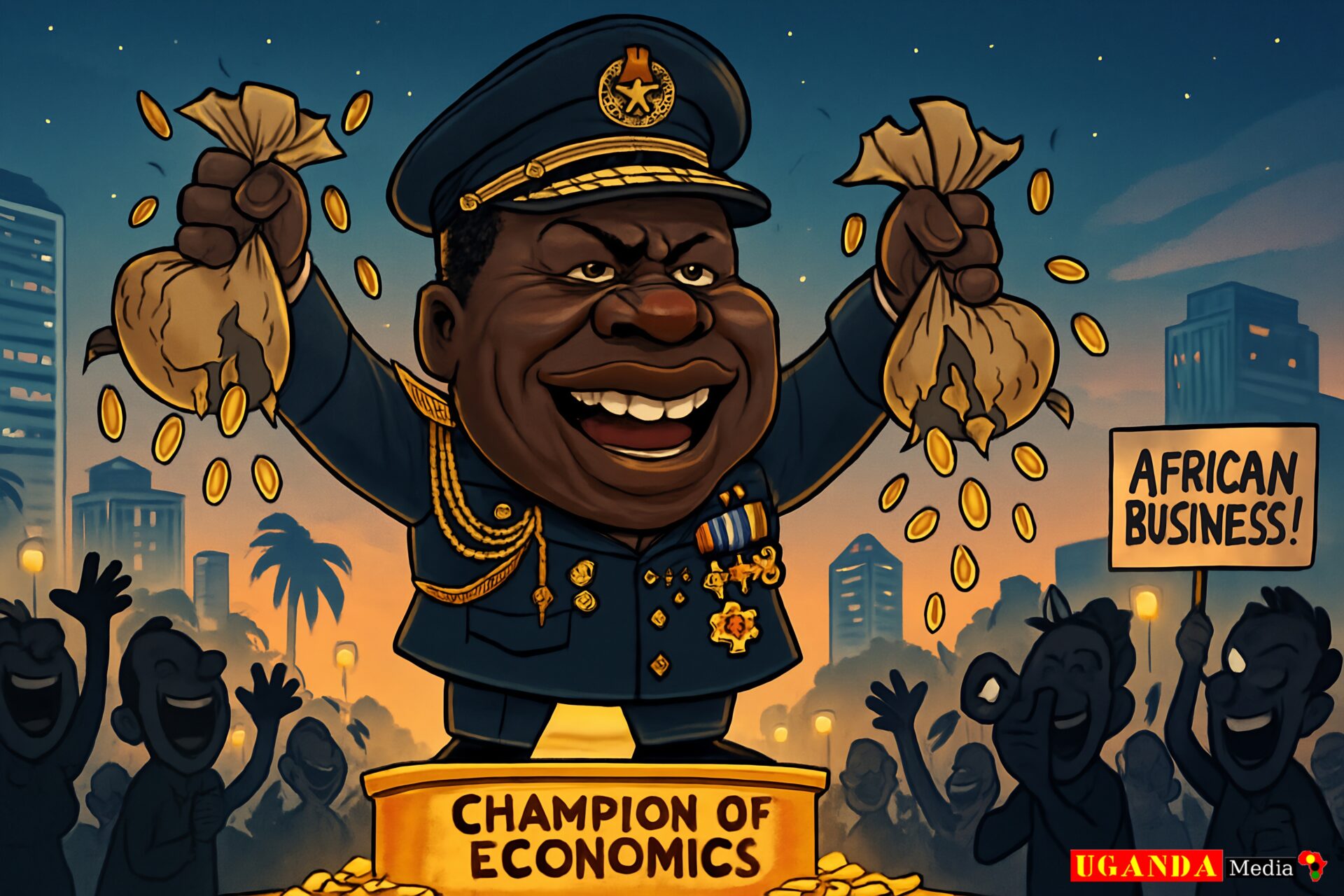
Amin’s desperate performance of strength ultimately revealed his fundamental weakness. His legacy reminds us that true power needs no performance – and that societies who confuse theatrics for leadership will pay the heaviest price.
The warning for modern Africa echoes clear:
“When a leader spends more time crafting his image than serving his people, he is not a lion – but a frightened hyena in a lion’s skin.”
11.Theatrical Cruelty: Amin’s Spectacle of Terror in Uganda
“When the executioner’s axe becomes a public show, even the innocent learn to applaud.”
(African proverb on the psychology of state terror)
Idi Amin transformed violence into a gruesome public theatre, understanding that sporadic brutality could control millions more effectively than constant surveillance. His regime’s practice of displaying mutilated bodies in the Nile River or at Kampala’s Clock Tower wasn’t merely punishment—it was psychological architecture, designed to reconstruct Ugandan society around a single unshakable truth: resistance equals annihilation.
The Anatomy of Amin’s Terror Theatre
1. The Nile as a Floating Gallery of Death
Bodies strategically placed at Owen Falls Dam where the White Nile begins its journey
Currents carried corpses downstream as “nature’s newsreel” to rural areas
Ugandan saying: “The river that shows its dead needs no other warning”
2. The Clock Tower Exhibitions
Decapitated heads placed on spikes at Kampala’s central traffic circle
Victims often dressed in their professional attire (doctors in lab coats, judges in robes)
African irony: “The chicken sees the knife but must still approach the slaughter”
3. Ritual Humiliation Before Death
Forced confessions broadcast on Radio Uganda
Public beatings of intellectuals at Nakasero Market
Modern parallel: ISIS’s staged drownings in Mosul
Why Spectacular Cruelty Works
The Mathematics of Terror
One public execution prevents 100 potential dissents
Ugandan wisdom: “A single burning hut illuminates the whole valley”
The Bystander Effect Institutionalized
Made complicity unavoidable—all citizens witnesses
African proverb: “Silence in the face of evil becomes its voice”
The Destruction of Moral Frameworks
Normalized the unthinkable through repetition
Psychological effect similar to Khmer Rouge killing fields
The Cultural Weaponization
Amin perverted traditional symbols:
Royal Drums of Buganda used to announce executions
Gomesi funeral attire mandated for victims’ families
Ugandan saying: “When the witchdoctor uses sacred tools for killing, even ancestors weep”
The Unraveling of the Spectacle
By 1977, the terror became counterproductive:
Archbishop Luwum’s Martyrdom
Anglican leader’s murder turned international opinion
African proverb: “The fly that challenges the spider draws the whole web’s attention”
1979 Economic Collapse
Starving citizens ceased fearing death
Ugandan wisdom: “A man who has lost his crops fears no flood”
Modern African Echoes
Eritrea’s “Shipping Container” prisons – invisible yet omnipresent threat
South Sudan’s public hangings – streamed on Facebook Live
Global Trend: Myanmar’s junta burning protestors alive
Conclusion: The Aftermath of Orchestrated Terror
As another Ugandan proverb reminds us:
“The tree of violence bears only two fruits – more violence, and silence.”
Amin’s theatrical cruelty left scars still visible in Uganda’s collective psyche today. His legacy demonstrates that while spectacle terror may control a population temporarily, it ultimately destroys the social fabric needed for any nation to function. The bodies in the Nile didn’t just carry away victims—they carried away Uganda’s future.
The warning for contemporary Africa resounds clearly:
“When a government turns its execution grounds into tourist attractions, the next stop on the tour is always the graveyard of democracy.”
The path forward lies in remembering another Ugandan truth:
“Not even the sharpest panga can cut water” — the resilience of human dignity ultimately outlasts even the most brutal regimes.
12.The Loyalty Economy: How Idi Amin Bought Complicity in Blood
“When the crocodile appoints the fish, it does not seek the wisest – only the most delicious.”
(Ugandan proverb on patronage politics)
Idi Amin transformed Uganda into a vast patronage network where loyalty became the sole currency of survival. His famous declaration—”The only currency I accept is loyalty”—established a political economy where positions, wealth, and even life itself depended on one’s willingness to participate in the regime’s crimes. This system of institutionalized complicity created a nation of hostages-turned-accomplices, binding Uganda’s elite to their dictator through shared guilt and stolen riches.
The Mechanics of Amin’s Patronage Machine
1. The Military as a Criminal Franchise
Promoted illiterate soldiers to generals overnight
Allowed officers to loot Asian businesses as “war trophies”
Ugandan saying: “When the lion shares his kill, even hyenas learn to roar his praises”
2. The Cabinet of Cronies
Appointed semi-literate tribesmen as “experts”
Foreign Minister Juma Oris (former bouncer) famously asked where Europe was located
African irony: “A blind man leading the blind makes a perfect parade for the one-eyed king”
3. The Economy of Stolen Goods
Distributed confiscated Mercedes-Benzes to loyalists
Turned State Research Bureau into a protection racket
Modern parallel: Mugabe’s “war veterans” seizing white farms
The Psychology of Institutionalized Complicity
The Faustian Bargain
Low-ranking soldiers given licence to rape and steal
Ugandan wisdom: “A shared crime becomes a shared noose”
The Hierarchy of Culpability
Created tiers of corruption to ensure mutual blackmail
African proverb: “When all hands are dirty, no one points fingers”
The Illusion of Mobility
Peasant soldiers became overnight millionaires
Psychological effect similar to Nazi Einsatzgruppen rewards
Cultural Perversions of Tradition
Amin distorted:
Ganda clan loyalty into blind obedience
Traditional gift-giving into institutionalized bribery
Ugandan saying: “When the chief’s stool is built with stolen wood, all must sit crooked”
The Cracks in the Patronage Pyramid
By 1978, the system began cannibalizing itself:
Purge of Early Supporters
Execution of Brigadier Charles Arube who helped Amin seize power
African wisdom: “The knife that cuts the meat soon meets the bone”
Economic Collapse
Nothing left to loot, loyalists turned on each other
Ugandan proverb: “When the honey is gone, even bees will sting their keeper”
Modern African Variations
Zimbabwe’s “Green Bombers” – youth militia rewarded with stolen farms
South Sudan’s “Dollar-a-Day” generals – entire army on patronage payroll
Global Parallel: Putin’s oligarch system
Conclusion: The Aftermath of Manufactured Loyalty
As another Ugandan proverb warns:
“A throne built on lies needs constant repainting.”
Amin’s loyalty economy collapsed because it mistook fear for allegiance and theft for governance. His legacy demonstrates that while patronage can purchase short-term survival, it inevitably bankrupts the nation’s future.

The lesson for contemporary Africa cuts deep:
“When a government pays its people in corruption instead of salaries, the final invoice always comes due in blood.”
Yet Uganda’s history also offers this resilient truth:
“Not even the sweetest sugar can preserve rotten meat” – all patronage systems ultimately succumb to their own corruption. The path forward lies not in perfect loyalty, but in institutions stronger than any one man’s hunger for sycophants.
13.The Myth of Invincibility: How Idi Amin Played God in Uganda
“When the antelope claims lion’s claws, even the leopard hesitates—but only until hunger returns.”
(Ugandan proverb on the limits of manufactured divinity)
Idi Amin’s carefully cultivated aura of immortality—from his famous declaration “I do not fear assassination—I am immortal” to claims of supernatural protection—reveals the dictator’s ultimate psychological weapon: the illusion of divine ordainment. This myth-making, while temporarily effective, contained the seeds of its own destruction, proving that in African politics, even self-proclaimed gods eventually face earthly reckonings.
Constructing the Living Deity
1. The Performance of Superhuman Strength
Staged photos wrestling crocodiles (with handlers ensuring safety)
Fabricated weightlifting feats (300kg lifts despite obvious photo edits)
Ugandan saying: “The hollowest drum echoes farthest”
2. Claiming Divine Protection
Boasted Muslim clerics gave him “invisible armour”
Claimed to survive assassination attempts through “Allah’s will”
African irony: “The witchdoctor who believes his own charms is first to be cursed”
3. The Cult of Physical Invulnerability
Walked unguarded through crowds (with snipers secretly deployed)
Dared opponents to kill him during speeches
Modern parallel: Mobutu’s “walking alone” through Kinshasa
The Psychology Behind the God-King Myth
Preemptive Deterrence
Potential plotters assumed assassination was impossible
Ugandan wisdom: “Men don’t sharpen knives against mountains”
The Prophet’s Paradox
The more outlandish the claims, the more believers he attracted
African proverb: “When madness wears gold, even the sane bow”
The Theatre of Omniscience
Claimed to know plotters before they acted
Psychological effect similar to North Korea’s “telepathic leadership”
Cultural Appropriation of Sacred Symbols
Amin hijacked:
Traditional Ganda royal regalia for his “conqueror” persona
Islamic martyr imagery despite his drunken debauchery
Ugandan saying: “When the hyena wears the lion’s skin, the moon still knows the truth”
The Unravelling of the God-Mask
By 1978, the cracks appeared:
The Tanzanian Invasion
Fleeing Kampala in pajamas shattered the warrior image
African wisdom: “Running feet confess what proud lips denied”
The Body Double Rumours
Suspicions he used lookalikes after botched assassination attempts
Ugandan proverb: “A shadow cannot stand when the tree falls”
Post-Fall Persistence of the Myth
Even in exile:
Libyan Exile (1979-2003)
Continued claiming he’d return to power
Modern parallel: Zimbabwe’s Mugabe believing he’d rule from grave
Death in 2003
Some supporters insisted he faked his death
African saying: “When the liar dies, his lies become shrines”
Modern African God-Kings
Equatorial Guinea’s Nguema: Claims to “stop bullets with mind”
Eritrea’s Afwerki: “The only brain the nation needs”
Global Parallel: Putin’s shirtless horseman imagery
Conclusion: The Mortality of Tyrants
As another Ugandan proverb teaches:
“However long the night, the rooster’s crow proves even dictators need sleep.”
Amin’s immortality myth ultimately failed because divinity cannot be claimed—only bestowed. His legacy demonstrates that when leaders confuse fear for worship, they forget the oldest African truth: all thrones are temporary, but the ground they stand upon is eternal.
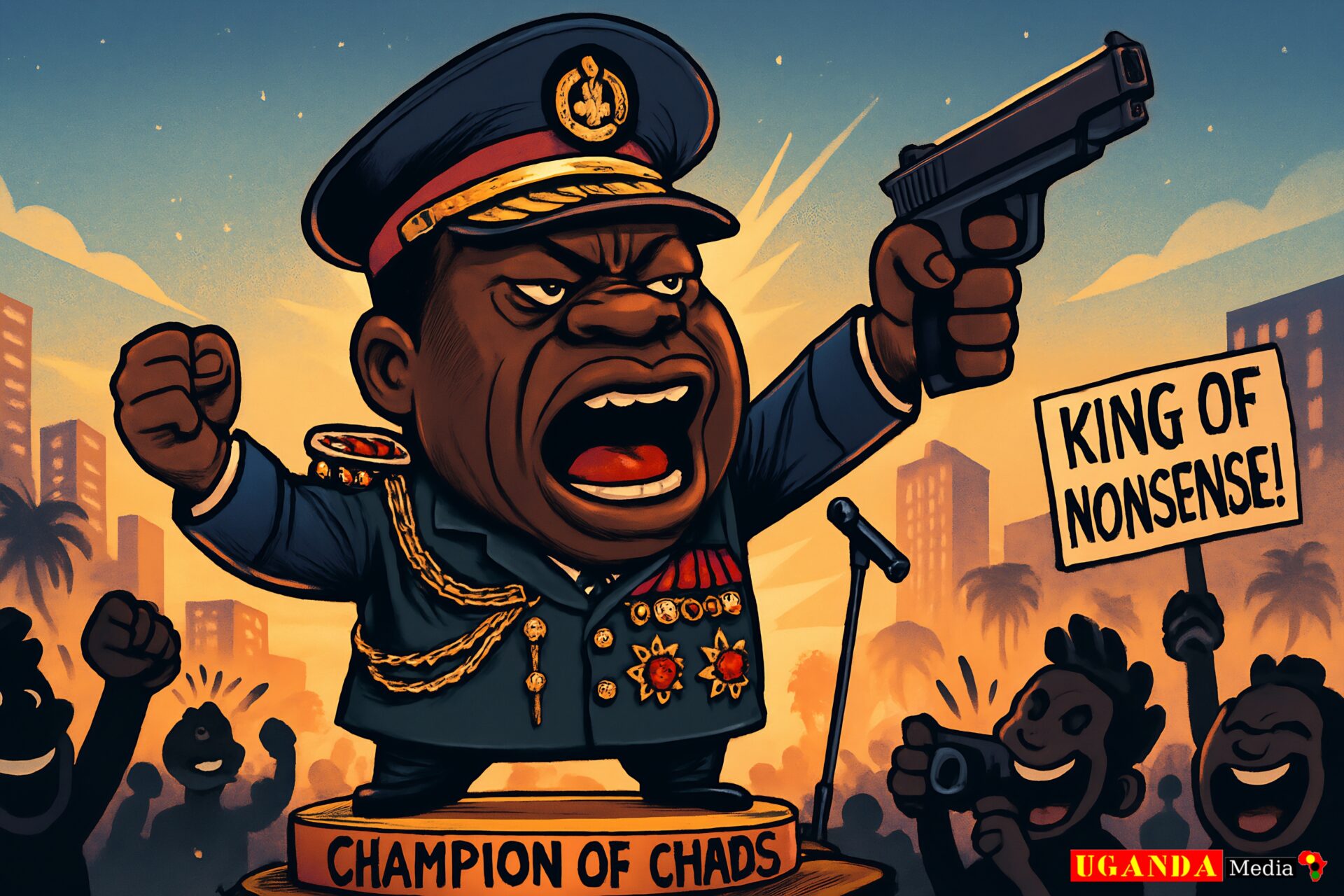
The warning for contemporary Africa resounds:
“Beware the man who builds his own altar—for he will be its first sacrifice.”
Yet within this lies hope:
“Not even the cleverest spider can web the whole sky” – no tyranny, however brilliantly constructed, can permanently suppress the human spirit. The true lesson of Amin’s fallen godhood is that in the end, reality always collects its debt.
14.Controlled Paranoia: Amin’s Web of Surveillance and the Death of Trust
“When the spider weaves its web across the village path, even brothers stop speaking lest they disturb the threads.”
(Ugandan proverb on the corrosive power of surveillance states)
Idi Amin’s Uganda became a nation of whispered conversations and sideways glances, where the State Research Bureau (SRB) turned every social interaction into potential evidence. This institutionalized paranoia didn’t just monitor dissent—it reengineered human relationships, transforming Uganda into a society where children feared parents, wives distrusted husbands, and neighbours became unpaid informants. The system’s brilliance lay in its terrible simplicity: make every citizen complicit in their own oppression.
The Architecture of Amin’s Surveillance State
1. The State Research Bureau (SRB) – Uganda’s Stasi
Headquartered in Nile Mansions with 20,000 operatives
Recruited one informer per 50 citizens (surpassing East Germany’s ratio)
Ugandan saying: “When the ants march in formation, know the anteater watches”
2. The Village-Level Spy Network
Teachers required to report “seditious” student conversations
Market women paid in salt for gossip about customers
African irony: “The ear that listens for enemies soon hears only itself”
3. The Technology of Fear
“Flying squads” in black Peugeot 504s conducting midnight raids
Torture chambers under Parliament building with soundproofing
Modern parallel: Rwanda’s “Ibuka” memorial informant system
The Psychology of Mass Complicity
The Banality of Evil Institutionalized
Farm wives filing reports to secure sugar rations
Ugandan wisdom: “Hunger makes the worm betray the soil”
The Manufacture of Collective Guilt
Forcing families to witness relatives’ interrogations
African proverb: “When all hands are dirty, no one points fingers”
The Death of Social Trust
Traditional “Ludago” evening gatherings disappeared
Cultural impact similar to Khmer Rouge destruction of family bonds
Cultural Perversion of Ubuntu Principles
Amin weaponized:
Traditional community policing (“Sungusungu”) into spy networks
Ganda clan loyalty into mandatory betrayal
Ugandan saying: “When the chief’s drum sounds wrong, the dancers must still move – but their hearts stop”
The Unintended Consequences
By 1978, the system began failing:
Informant Fatigue
False reports flooded SRB to meet quotas
African wisdom: “When all trees are marked as dangerous, the forest becomes safe”
Economic Collapse
Productivity vanished as everyone watched everyone
Ugandan proverb: “A field guarded too closely grows only weeds”
Modern African Surveillance States
Eritrea’s “Neighbourhood Watch” – mandatory reporting on relatives
Rwanda’s Imihigo system – performance contracts requiring denunciations
Global Parallel: China’s social credit system
Conclusion: The Aftermath of Manufactured Distrust
As another Ugandan proverb warns:
“The knife that cuts the community’s fabric leaves rags that never sew back whole.”
Amin’s surveillance state didn’t just collapse with his regime—it left scars still visible in Uganda’s social DNA today. His legacy demonstrates that while fear can rule a generation, only trust can build a future.
The lesson for contemporary Africa cuts deep:
“When a government plants informants instead of crops, the harvest will always be hunger—both of bread and of truth.”
Yet within this darkness lies resilience:
“Not even the cleverest spider can web the whole sky” – the human capacity for trust, though battered, ultimately outlives even the most perfect systems of control. The path forward lies not in forgetting this history, but in understanding how completely a nation can be broken—and how courageously it can heal.
15.The Long Arm of the Tyrant: How Amin Terrorized Uganda’s Exiles and the Modern Blueprint for Transnational Repression
“When the leopard cannot reach the bird in the tree, it waits for the wind to break its wings.”
(Ugandan proverb on the persistence of predatory power)
Idi Amin understood that his reign of terror would mean little if Ugandans could simply flee to safety abroad. His campaign against exiles—from the 1977 murder of Archbishop Janani Luwum to the hunting of dissidents in neighbouring Kenya—established a template now perfected by modern dictators. This globalization of repression transforms borders into mere inconveniences for authoritarian regimes, ensuring no critic is ever truly safe.
Amin’s Machinery of Transnational Terror
1. The 1977 London Assassination Attempt
Sent hitmen to kill exiled former President Obote
British police intercepted plot at Heathrow
Ugandan saying: “The crocodile’s teeth grow long, but not long enough to bite another country’s moon”
2. The Nairobi Connection
Kenyan Special Branch collaborated with Ugandan agents
Disappearances of exiles like journalist Byron Kawadwa
African irony: “When two dictators shake hands, migrants count their fingers”
3. The Internationalization of Repression
Pressured Tanzania to return Obote loyalists
Threatened Zambia over hosting dissidents
Modern parallel: Rwanda’s extraterritorial killings
The Psychology of Exile Terror
The Demonstration Effect
Archbishop Luwum’s murder showed no one was beyond reach
Ugandan wisdom: “A single slaughtered chicken freezes the whole coop”
The Manufacture of Universal Fear
Forced families abroad to send “loyalty declarations”
African proverb: “When the chief’s voice crosses rivers, even fish learn to tremble”
The Destruction of Safe Havens
Made refugees doubt host countries’ protection
Psychological impact similar to Russian defectors’ paranoia
Cultural Weaponization of Kinship Ties
Amin perverted:
Traditional clan protection systems into informant networks
Ganda burial customs by refusing to return exiles’ bodies
Ugandan saying: “When ancestors’ bones become bargaining chips, the living, lose their compass”
Modern Africa’s Transnational Repression
Rwanda’s Global Reach
Kagame’s alleged killings in South Africa, UK
Use of INTERPOL Red Notices against critics
Uganda’s Continued Harassment
Museveni’s surveillance of diaspora activists
Abductions of opponents from Kenya
China’s Model
“Fox Hunt” operations targeting exiles worldwide
Global trend: 34 dictators now use transnational repression
The Limits of Tyrants’ Long Arms
By 1979, Amin’s overreach backfired:
Tanzania Invasion sparked by exile-supported resistance
International Isolation from assassination attempts
African wisdom: “The snake that strikes too far from its hole dies thirsty”
Conclusion: Protecting the Right to Escape
As another Ugandan proverb teaches:
“Not even the tallest tree can shade the whole Savannah.”
Amin’s failed exile hunts reveal an eternal truth: while dictators may temporarily project power across borders, freedom has more hiding places than tyranny has weapons. Yet today’s technological repression tools make his crude methods seem antiquated.
The challenge for modern democracies is stark:
“When host nations profit from dictator’s gold, can they still hear the exile’s whisper?”
The path forward lies in remembering:
“A refugee’s suitcase always carries two things: what they fled from, and what they dream of becoming.”
Protecting that dream remains our shared responsibility against the long arm of modern authoritarianism.
16.The Circus of Distraction: Amin’s Grand Delusions and the Art of Misdirection
“When the village burns, the clever chief stages a dance — his people will watch the flames through dancing feet.”
(Ugandan proverb on political distraction tactics)
Idi Amin transformed Uganda into a macabre theatre, where the spectacle of excess served as camouflage for atrocity. As children starved in Teso and bodies floated down the Nile, the dictator preoccupied his populace with ever more extravagant absurdities—from awarding himself the title “Lord of All the Beasts of the Earth and Fishes of the Seas” to spending £2 million (equivalent to £20 million today) on a wedding while hospitals lacked aspirin. This calculated buffoonery followed an ancient authoritarian playbook: when governance fails, distract with pageantry.
The Anatomy of Amin’s Distraction Machinery
1. The Title Factory: Manufacturing Grandeur
Created 28 self-bestowed honorifics, including:
“Conqueror of the British Empire” (despite Britain leaving voluntarily)
“Last King of Scotland” (a country he’d never visited)
Ugandan saying: “The empty calabash floats the highest on the flood”
2. The Wedding Spectacles
1975 marriage to Sarah Kyolaba featured:
A cake taller than the bride
20,000 imported roses
A gold-plated AK-47 as wedding gift
African irony: “When the antelope feasts during drought, the hyenas take notes”
3. The Absurdity of Statecraft
Proposed Ugandan space programme to NASA
Declared himself “World Heavyweight Boxing Champion” by decree
Modern parallel: Bokassa’s imperial coronation in CAR
The Psychology Behind the Spectacle
The Bread and Circuses Doctrine
1970s Kampala had more parade grounds than functioning schools
Ugandan wisdom: “A dancing man forgets his empty stomach”
The Normalization of Madness
Made atrocities seem mundane by comparison
African proverb: “When elephants juggle, who notices the crushed grass?”
The Foreign Correspondents’ Trap
Western media obsessed over his antics while ignoring executions
Legacy continues: Western coverage of modern dictators’ eccentricities
Cultural Appropriation of Royal Tradition
Amin bastardized:
Ganda coronation rituals for his self-crowning
Traditional empaako naming system for fake honours
Ugandan saying: “When the crow wears eagle’s feathers, the sky still knows the impostor”
The Unravelling of the Circus
By 1978, the distractions failed:
Economic Reality Intruded
Sugar rationing made wedding cakes impossible
African wisdom: “No amount of drumming fills the granary”
The Tanzania War
Tank parades couldn’t stop actual tanks
Ugandan proverb: “Paper shields melt in real rain”
Modern Africa’s Distraction Dictators
Equatorial Guinea’s Nguema: $600m capital city while children starve
Zimbabwe’s Mugabe: 91st birthday cake weighing 91kg
Global Parallel: Duterte’s drug war as distraction from corruption
Conclusion: Seeing Through the Spectacle
As another Ugandan proverb warns:
“The cleverest monkey still shows its red bottom when it dances too long.”
Amin’s circus ultimately failed because no amount of glitter can permanently disguise bloodstains. His legacy teaches us that populations will tolerate distraction—but only until their children’s hunger cries drown out the drums.
The lesson for contemporary observers is clear:
“When a leader spends more time crafting his titles than his policies, check what grows in the shadows of his letters.”
Yet within this darkness lies an enduring truth:
“Not even the loudest drum can stop the sun from rising” – all authoritarian spectacles eventually face the dawn of accountability. The challenge for citizens is to stop applauding before the final act.
17.The Legacy Delusion: Idi Amin’s Tragic Pursuit of Immortality
“The elephant that trumpets its own greatness leaves only footprints in the mud.”
(Ugandan proverb on the vanity of self-glorification)
Idi Amin’s desperate craving for historical validation reveals the dictator’s ultimate paradox: the more violently he sought to etch his name in history, the more he guaranteed his infamy. His boasts—”History will remember me as Africa’s greatest leader”—mirrored Stalin’s photo manipulations and Mobutu’s reinvented pre-colonial fantasies. This pathological legacy-building exposes tyranny’s dirty secret: even the most brutal strongmen hunger for something they can never possess—genuine reverence.
Amin’s Futile Attempts to Sculpt History
1. The Rewriting of Textbooks
Ordered schools to teach his “9,000 Victories” against nonexistent enemies
Declared himself founder of Ugandan nationalism (erasing pre-independence leaders)
Ugandan saying: “The liar who rewrites the past must hire endless scribes”
2. The Monumental Ego Projects
“Amin Stadium” built with forced labor collapsed within months
Planned 100-foot bronze statue (abandoned after foundation cracks)
African irony: “Termites care not for the name carved on the wood”
3. The Foreign Press Obsession
Hired London PR firm to place flattering international articles
Paid for “documentaries” portraying him as folk hero
Modern parallel: Kagame’s expensive Western lobbyists
The Psychology Behind Legacy Obsession
The Narcissism of Tyranny
Commissioned portraits showing him as medieval warrior
Ugandan wisdom: “The pond that worships its own reflection soon stagnates”
The Historical Illiteracy
Believed brutality equalled greatness
African proverb: “The axe forgets, but the tree remembers”
The Validation Vacuum
International pariah status increased legacy desperation
Psychological parallel: Gaddafi’s Green Book delusions
Cultural Appropriation of Memory
Amin corrupted:
Traditional Ganda royal historians into propagandists
Oral storytelling traditions to spread fabricated legends
Ugandan saying: “When the chief rewrites the clan’s songs, the ancestors go mute”
The Unravelling of the Fantasy
By exile, the delusion persisted:
Libyan Exile (1979-2003)
Dictated “memoirs” full of imagined triumphs
African wisdom: “The farther the lie travels, the more luggage it requires”
Death in 2003
Obituary headlines: “Butcher of Uganda”
Ugandan proverb: “The funeral drum beats only the truth”
Modern Africa’s Legacy Obsessives
Rwanda’s Kagame: Building $50m genocide memorials while silencing critics
Zimbabwe’s Mugabe: $10m mausoleum for his contested legacy
Global Parallel: Putin’s “historical truth” decrees
Conclusion: The Tyrant’s Epitaph
As another Ugandan proverb teaches:
“The stream remembers no man’s name—only the stones he threw.”
Amin’s legacy fixation ultimately proved that history cannot be commanded—only earned. His tragedy was failing to understand that true remembrance comes not from forced declarations, but from voluntary respect.
The warning for contemporary strongmen echoes clear:
“A nation that is forced to mourn will eventually choose to forget.”
Yet within this lies an enduring truth:
“Not even the deepest footprint can stop the river’s flow” – all dictators, no matter how violently they scribble their names, are ultimately just footnotes in history’s relentless current. The true legacy any leader leaves is written not in monuments, but in the uncoerced memories of those they governed.
18.The Fallacy of Forever: Why No Dictator Outruns the Storm
“The river that forgets its course will always return to the sea.”
(Ugandan proverb on the inevitability of change)
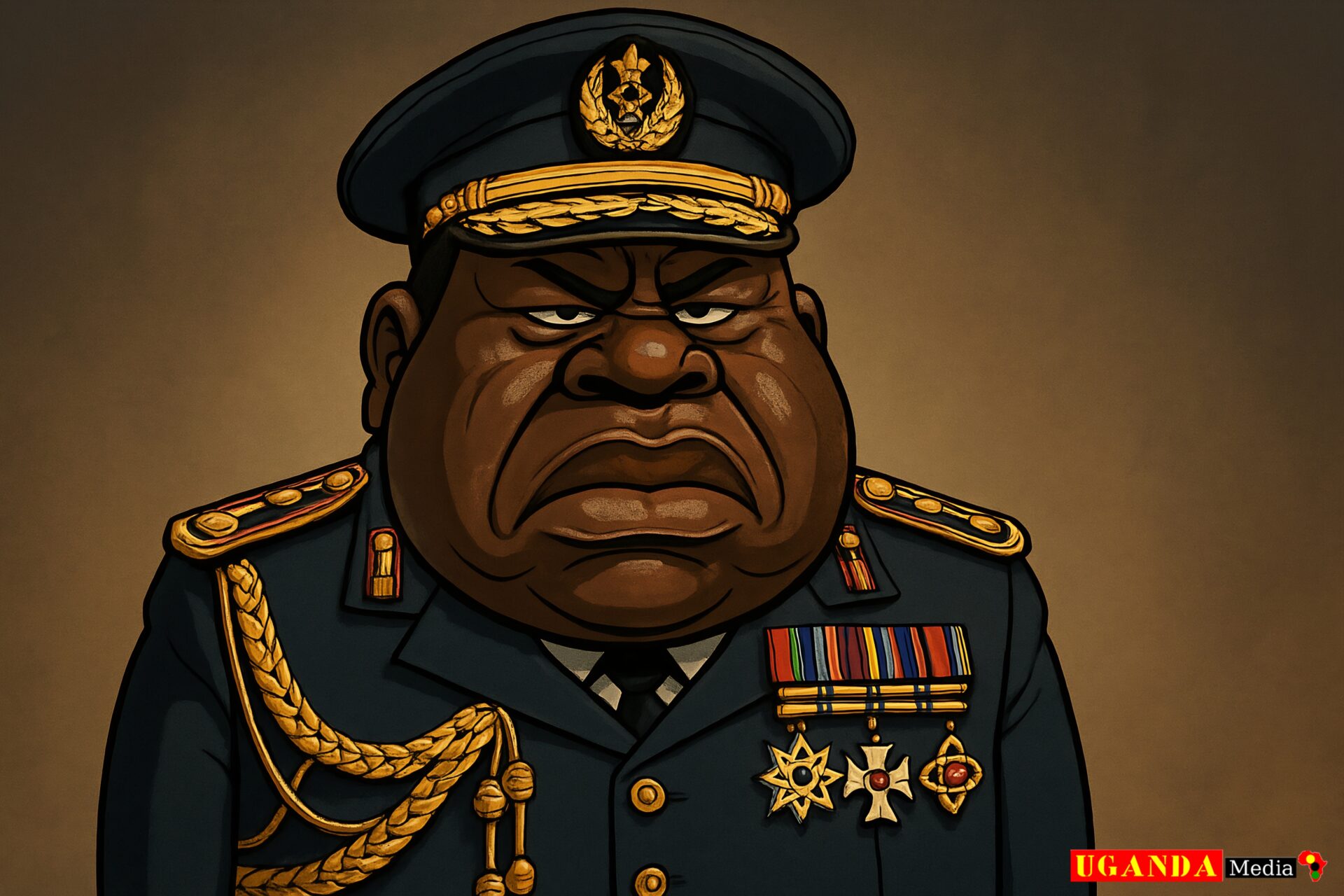
Idi Amin’s catastrophic fall in 1979—fleeing Kampala in a convoy of commandeered Coca-Cola trucks—proved the ultimate African political truth: no tyranny is eternal. His belief in personal invincibility (“I rule by divine right”) collided violently with reality when Tanzanian tanks rolled into the capital, exposing the fundamental fragility of even the most brutal regimes. This lesson echoes through Uganda’s history, from the British departure in 1962 to Museveni’s own increasingly desperate grip on power today.
The Anatomy of a Dictator’s Fall
1. The Isolation Trap
Amin’s purges left him surrounded by sycophants
Military intelligence became fantasy (“Our soldiers are winning” as Tanzania advanced)
Ugandan saying: “When the chief only hears echoes, he forgets the sound of truth”
2. The Economic Reckoning
1970s hyperinflation made soldiers’ salaries worthless
Army loyalty crumbled when foreign currency reserves hit zero
African wisdom: “A hungry lion follows no master”
3. The Overreach Principle
1978 invasion of Tanzania (the “Kagera War”) proved fatal miscalculation
Modern parallel: Putin’s Ukraine disaster
Why Tyrants Always Fall
The Paradox of Fear
Extreme brutality creates more enemies than it eliminates
Ugandan proverb: “You cannot kill all the birds who know your secrets”
The Generational Shift
Youth born under repression have no memory of alternatives
African saying: “The child who never knew fire will still scream when burnt”
The Corruption Metastasis
Amin’s patronage system collapsed when nothing remained to loot
Economic truth: “A thief cannot govern an empty house”
Cultural Wisdom on Power’s Limits
African traditions long predicted Amin’s fate:
Ganda coronation rituals require kings to acknowledge mortality
Luo folk tales warn of hyenas destroyed by their own greed
Ugandan saying: “The higher the anthill, the sooner the aardvark comes”
Modern Africa’s Fading Strongmen
Zimbabwe’s Mnangagwa: Repeating Mugabe’s economic crimes
Rwanda’s Kagame: Succession tensions beneath surface calm
Uganda’s Museveni: 37+ years breeding same discontent
Conclusion: The Storm Always Comes
As another Ugandan proverb teaches:
“However long the night, the rooster’s crow proves no darkness is permanent.”
Amin’s spectacular fall reminds us that dictatorships contain the seeds of their own destruction—in their paranoia, their greed, their inevitable miscalculations. The challenge for oppressed societies isn’t whether the tree will fall, but preparing to plant new seeds when it does.
The enduring lesson?
“When the mighty mugumo tree falls, the forest doesn’t mourn—it grows towards the light.”
No tyranny, however brutal, can permanently suppress the human spirit’s relentless push for freedom. Amin’s flight into exile wasn’t just his personal end—it was Uganda’s eternal reminder that no storm lasts forever, and no tree grows so tall it cannot be felled.
19.The Post-Dictatorship Paradox: Why the Shadow of Tyrants Lingers
“The child who never knew the lion still fears the roar in the storyteller’s voice.”
(Ugandan proverb on the persistence of traumatic memory)
In Uganda’s bustling taxi parks and rural trading centres, a disturbing phenomenon emerges: nostalgic recollections of Idi Amin’s era from those too young to remember its horrors. This collective amnesia, where trauma fades but charismatic strongman imagery endures, reveals a painful truth about post-dictatorship societies—the human mind often romanticizes order while forgetting its brutal cost.
The Anatomy of Dictatorial Nostalgia
1. The Selective Memory Syndrome
Remembered: “Amin made trains run on time” (they didn’t)
Forgotten: The 300,000 disappeared
Ugandan saying: “The axe forgets, but the tree remembers—yet new saplings only see straight trunks”
2. The Charisma Mirage
Younger generations recall folkloric tales of:
Wrestling crocodiles (staged)
Expelling Asians (economic disaster)
African irony: “The farther the fire recedes, the warmer its memory feels”
3. The Present Discontent Factor
Current governance failures make past seem preferable
Modern parallel: Russians nostalgic for Stalin during the 1990s chaos
Why Societies Misremember Tyrants
The Trauma Time-Lag
Those who suffered most die first
Ugandan wisdom: “Gravestones make poor storytellers”
The Nationalism Trap
“He stood up to foreigners” overshadows domestic terror
African proverb: “The warrior’s statue never shows the widows”
The Order Illusion
Dictatorship’s simplicity contrasts with democracy’s mess
Psychological phenomenon: “Stockholm syndrome of the state”
Cultural Roots of Nostalgia
Uganda’s oral traditions contribute:
Ebyafayo tales (historical narratives) soften edges over time
Luganda sayings like “Obwavu tebwogera” (poverty doesn’t speak) suppress painful memories
Modern manifestation: Social media memes trivializing torture sites
The Danger of Romanticized Brutality
Recycling of Tyranny
Museveni borrows Amin’s nationalist rhetoric
Ugandan saying: “The masquerader inherits the original’s footsteps”
Democratic Erosion
“We need a strong hand” becomes political argument
African warning: “The leash remembered fondly becomes a collar”
Historical Distortion
Younger activists reference “Amin’s economic war” as inspiration
Global parallel: Pinochet’s Chicago Boys rehabilitation
Breaking the Nostalgia Cycle
Truth Preservation
Uganda’s limited memorialization (compared to Rwanda’s genocide sites)
African wisdom: “A scar properly tended teaches the next generation”
Economic Justice
Addressing present grievances that fuel past idealization
Ugandan saying: “A full stomach digs no graves to revisit”
Cultural Reckoning
Artists like Bobi Wine challenging sanitized histories
Modern tool: “Documentary film as collective memory”
Conclusion: The Tyrant’s Afterlife
As another Ugandan proverb warns:
“The ghost only walks where the living leave space in their beds.”
Amin’s lingering shadow reminds us that defeating a dictator is only half the battle—the harder fight is against the seductive myths that outlive them. True freedom requires not just removing the tyrant, but exorcising the parts of ourselves that still, secretly, long for his certainty.
The path forward lies in understanding:
“Nostalgia is hunger eating its own tail—only truth can make us full.”

For Uganda and all post-authoritarian societies, the work continues not in presidential palaces, but in the quiet spaces where individual memories meet national history—and choose remembrance over fantasy.
20.Lessons from the Abyss: Resisting Psychological Domination in Modern Africa
“When the elephant dances, the wise ant learns both the steps and the stomps.”
(Ugandan proverb on learning from oppressive systems)
Idi Amin’s regime provides a grim blueprint for psychological domination, yet within its horrors lie vital lessons for resisting modern authoritarianism. As Africa faces new waves of strongman politics—from Rwanda’s technocratic autocracy to Uganda’s gerontocratic rule—understanding Amin’s tactics becomes both shield and weapon for democratic survival.
The Dictator’s Playbook & Civil Society’s Antidote
1. Recognizing the Strongman’s Rhetoric
Amin’s Tool: Absolute declarations (“I am the law”)
Antidote: Ugandan saying: “The tree that claims to be the forest will soon stand alone”
Modern Application: Calling out Museveni’s “I am the only one who can lead Uganda” narratives
2. Institutional Immunity Building
Amin’s Strategy: Gutting judiciary, parliament, media
Resistance Model: Kenya’s 2010 constitutional safeguards
African wisdom: “The termites enter through the cracked wall”
3. The Truth-Teller Networks
1970s Survival: Underground church groups documenting atrocities
Today’s Version: Encrypted whistleblower platforms like “Uganda Watch”
Proverb: “The whispering reeds outlast the shouting storm”
Psychological Resistance Tactics
Cognitive Dissonance Weaponization
Amin relied on forced public compliance breeding private doubt
Counter-tactic: Zimbabwe’s “Vigil” movement’s silent protests
Ugandan saying: “The still river cuts deepest”
Humour as Subversion
1970s jokes: “Why is Uganda’s currency worthless? Amin’s face is on it”
Modern parallel: #MuhooziProject memes mocking Museveni’s son
African wisdom: “Laughter makes the dictator’s mask slip”
Alternative Memory Systems
Traditional “ebifa” historians preserving truth orally
Today’s digital archives like “Uganda Memory Project”
Proverb: “The storyteller’s fire never dies”
Safeguarding Democratic Institutions
Lesson from Amin’s Fall: His first targets were:
Independent Judiciary
Replaced with “kangaroo courts”
Modern defence: Kenya’s judicial independence movement
Free Press
Turned Uganda Argus into propaganda sheet
Current resistance: Uganda’s “alternative media” bloggers
Civil Service
Politicized into patronage network
Counter-model: Botswana’s meritocratic bureaucracy
Ugandan saying: “When termites eat the foundation, the roof dances”
The Youth Factor: Breaking the Cycle
Amin exploited post-colonial disillusionment. Today’s solutions:
Civic Education: Teaching critical thinking over hero-worship
African proverb: “The sharpest machete is the educated mind”
Economic Alternatives: Reducing youth vulnerability to strongman patronage
Ugandan saying: “A hand with work doesn’t hold weapons”
The International Community’s Role
1970s Failures:
Britain’s initial recognition of Amin’s coup
Lesson: “The snake you ignore today bites your neighbour tomorrow”
Modern Tools:
Magnitsky sanctions targeting dictators’ finances
ICC prosecutions (however imperfect)
Conclusion: The Unbreakable Calabash
As another Ugandan proverb teaches:
“However many times the gourd rolls, it always comes to rest on its base.”
Amin’s reign proved that while tyranny can bend societies, it cannot permanently break their spirit. The resistance methods honed under his regime—from coded church sermons to marketplace whispers—evolve today into digital activism and constitutional vigilance.
The ultimate lesson?
“Dictators fear not the shout in the street, but the quiet thought in the classroom.”
For Uganda and Africa, the path forward lies in nurturing institutions stronger than any individual, memories more enduring than propaganda, and a citizenry that remembers:
“The storm passes, but the roots remain.”
No tyranny is eternal—but freedom’s survival demands we learn equally from history’s darkness and its resilient light.
Conclusion: The Dictator’s Curse: Power Without Legacy — Lessons from Amin’s Uganda
“The leopard may rule the forest for a season, but the trees will outlast every reign.”
(African proverb on the impermanence of tyrannical power)
Idi Amin’s grotesque spectacle of power—where the same hands that signed execution orders also pretended to conduct orchestras—exposed the fundamental emptiness at the dictatorship’s core. His regime serves as Africa’s most vivid demonstration of the dictator’s paradox: absolute power ultimately begets absolute oblivion. While modern strongmen from Kampala to Moscow still chase Amin’s playbook of fear and pageantry, his crumbling legacy whispers the same truth to every would-be tyrant: you cannot build eternity on bones.
The Anatomy of a Failed Legacy
1. The Charisma Mirage
Amin’s carefully crafted image:
The crocodile-wrestling strongman (with handlers ensuring safety)
The self-proclaimed “Conqueror of the British Empire”
Ugandan saying: “A mask worshipped too long becomes the face’s grave”
2. The Terror Trap
300,000 killed created not loyalty but latent vengeance
African wisdom: “Blood makes poor mortar for building legacies”
3. The Economic Illusion
Stolen Asian wealth evaporated within years
Modern parallel: Zimbabwe’s looted farms now lying fallow
Why Tyrants Cannot Craft True Legacy
The Historical Immune System
Truth eventually outs, as with Amin’s torture chambers exposed
Ugandan proverb: “Not even the deepest grave can swallow all evidence”
The Succession Paradox
Fear-based regimes lack peaceful transition mechanisms
African saying: “A throne built on swords becomes a seat of blades”
The Cultural Rejection
Uganda’s artists (Okot p’Bitek, Ngugi wa Thiong’o) immortalized his brutality
Modern example: Zimbabwe’s protest music outlasting Mugabe
Amin’s Ghost in Modern Africa
Today’s strongmen repeat his mistakes:
Museveni’s Uganda: Personality cult crumbling as economy fails
Kagame’s Rwanda: “Efficiency” masking repression
Biya’s Cameroon: 40-year rule leaving only decay
Continental warning: “The python that eats its own tail still starves”
The People’s Ultimate Victory
Memory as Resistance
Uganda’s “Hidden Voices” oral history projects
Proverb: “The storyteller’s fire burns longer than the dictator’s palace”
Institutional Antibodies
Kenya’s 2010 constitution as safeguard model
Botswana’s enduring democracy showing alternatives
Youth Awakening
#EndSARS in Nigeria
Uganda’s #PeoplePower movement
African hope: “No seed planted in daylight grows crooked”
Conclusion: The Silence After the Drums
As another Ugandan proverb teaches:
“When the drummers exhaust themselves, the dancers finally hear their own heartbeat.”
Amin’s curse—shared by all who rule through fear—is that his name endures not in glory but as a cautionary tale. The empty drums of dictatorship may boom temporarily, but history’s quiet judgment always follows.
For contemporary Africa, the lesson crystallizes:
“Tyranny is borrowed time compounded with stolen dreams.”
The path forward lies not in strongmen’s hollow promises, but in the patient building of societies where:
“The tallest tree is the rule of law, not the loudest voice.”
Amin’s ultimate legacy? Proof that no darkness, however deep, can extinguish light forever. As Uganda and Africa navigate new authoritarian challenges, this truth remains our compass: the dictator’s curse is democracy’s hope.
Food for Thought: Immunising Society Against Tyranny: Africa’s Eternal Questions
“The wise antelope studies the lion’s shadow before drinking at the watering hole.”
(Ugandan proverb on political vigilance)
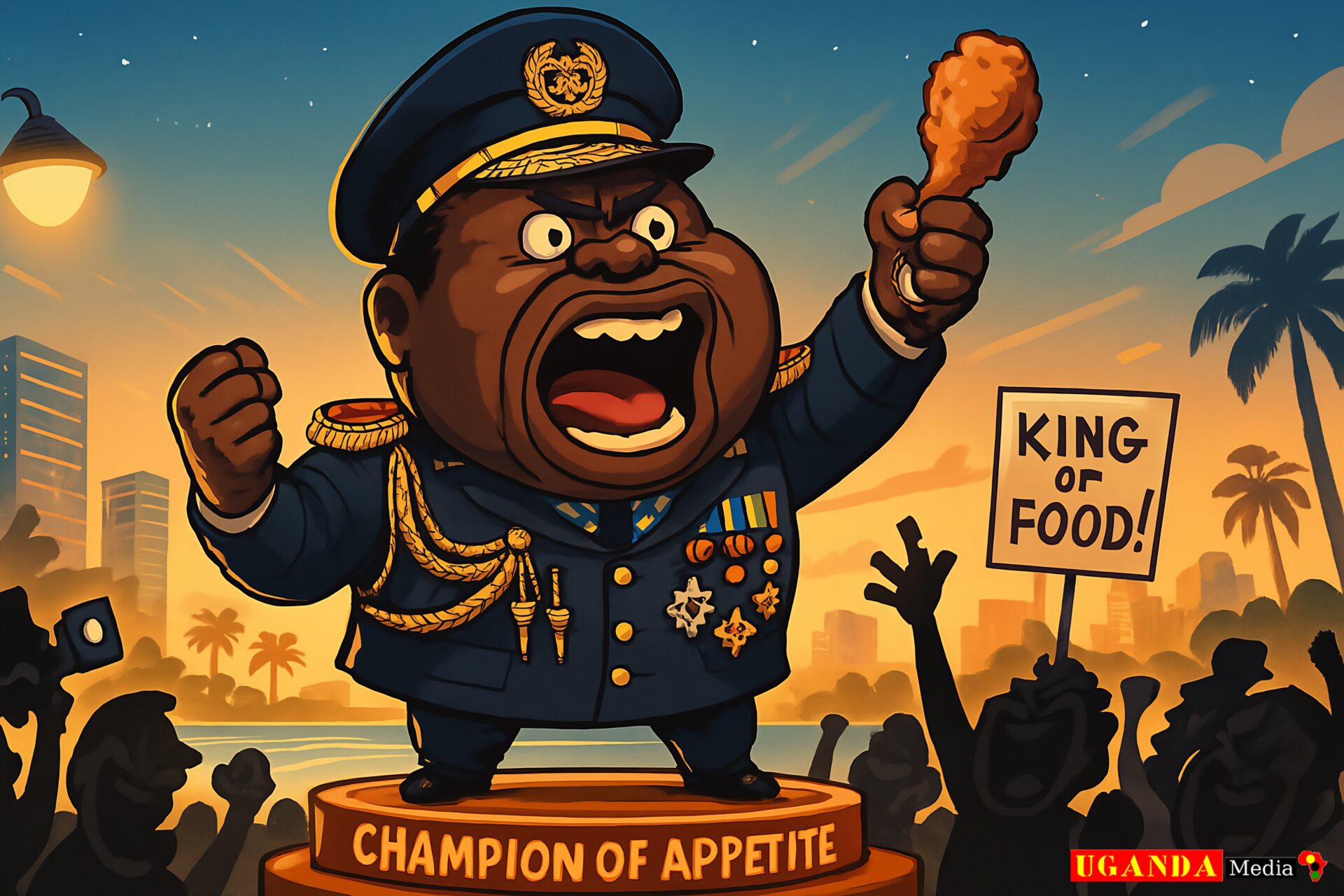
The spectre of Idi Amin’s regime forces us to confront three existential questions that echo across Africa’s political landscape. These are not academic musings, but urgent survival questions for nations oscillating between democracy and despotism.
1. Can Society Vaccinate Itself Against Tyranny?
The Amin Case Study:
Destroyed independent institutions within 18 months of taking power
Turned the military into a tribal militia
Ugandan saying: “When termites go unchecked, even stone houses collapse”
Modern Antibodies Emerging:
Constitutional Safeguards: Kenya’s 2010 constitution limiting presidential terms
Civic Education: Ghana’s national democracy curriculum
Technology: Zimbabwe’s “ZimEye” exposing corruption in real-time
African wisdom: “The best time to repair the roof is when the sun shines”
2. Why Do People Follow Those Who Despise Them?
The Psychology of Submission:
Amin’s victims often praised him publicly while whispering dissent
Ugandan proverb: “The chicken applauds the hawk’s flight to avoid being next”
Modern Manifestations:
Stockholm Syndrome of the State: Rwandans praising Kagame while fleeing
Economic Coercion: Nigerian youth chanting “Buhari” for N5,000 handouts
Tribal Calculation: “Better our thief than their saint” politics
Breaking the Spell:
Botswana’s meritocratic tradition shows alternatives
African saying: “A people who sell their votes will eat their children’s future”
3. Is the Strongman Inevitable in African Politics?
Historical Patterns:
Pre-colonial checks and balances (Ganda Lukiko councils)
Colonialism’s “indirect rule” bred modern autocrats
Ugandan wisdom: “The borrowed knife always cuts deepest”
Contemporary Crossroads:
Demographic Hope: Africa’s youth bulge demanding accountability
Institutional Models: Namibia’s stable transitions
Technological Disruption: #ZimbabweanLivesMatter digital activism
The Critical Balance:
African proverb: “A chief without critics is a village waiting to burn”
The Continental Prognosis
Pessimistic Indicators:
23 African leaders exceeding constitutional term limits
Erosion of judicial independence across ECOWAS states
Ugandan saying: “When the bee abandons its hive, the wax moths feast”
Hopeful Signs:
Sudan’s 2019 revolution showing military can be challenged
Zambia’s 2021 electoral transition proving alternance possible
African wisdom: “Even the longest night meets dawn”
Conclusion: The Laboratory of Democracy
As another Ugandan proverb teaches:
“The best fertilizer for the future is the lessons of the past.”
Amin’s ghost forces us to recognise that tyranny isn’t an accident but a choice societies make through:
Institutional neglect
Civic complacency
Historical amnesia
The answers to our three questions will indeed determine more than Uganda’s future—they will shape whether Africa becomes:
“The graveyard of recycled dictators”
Or “The proving ground for 21st century democracy”
The path forward lies in remembering:
“A people who forget their past dictators will recognise their return too late.”
Ultimately, the vaccine against tyranny exists in:
Strong institutions over strongmen
Critical citizenship over blind loyalty
Collective memory over convenient forgetting
Africa’s choice is clear: build democracies that outlive individuals, or remain trapped in the strongman’s endless curse. The watering hole is before us—will we drink wisely?




